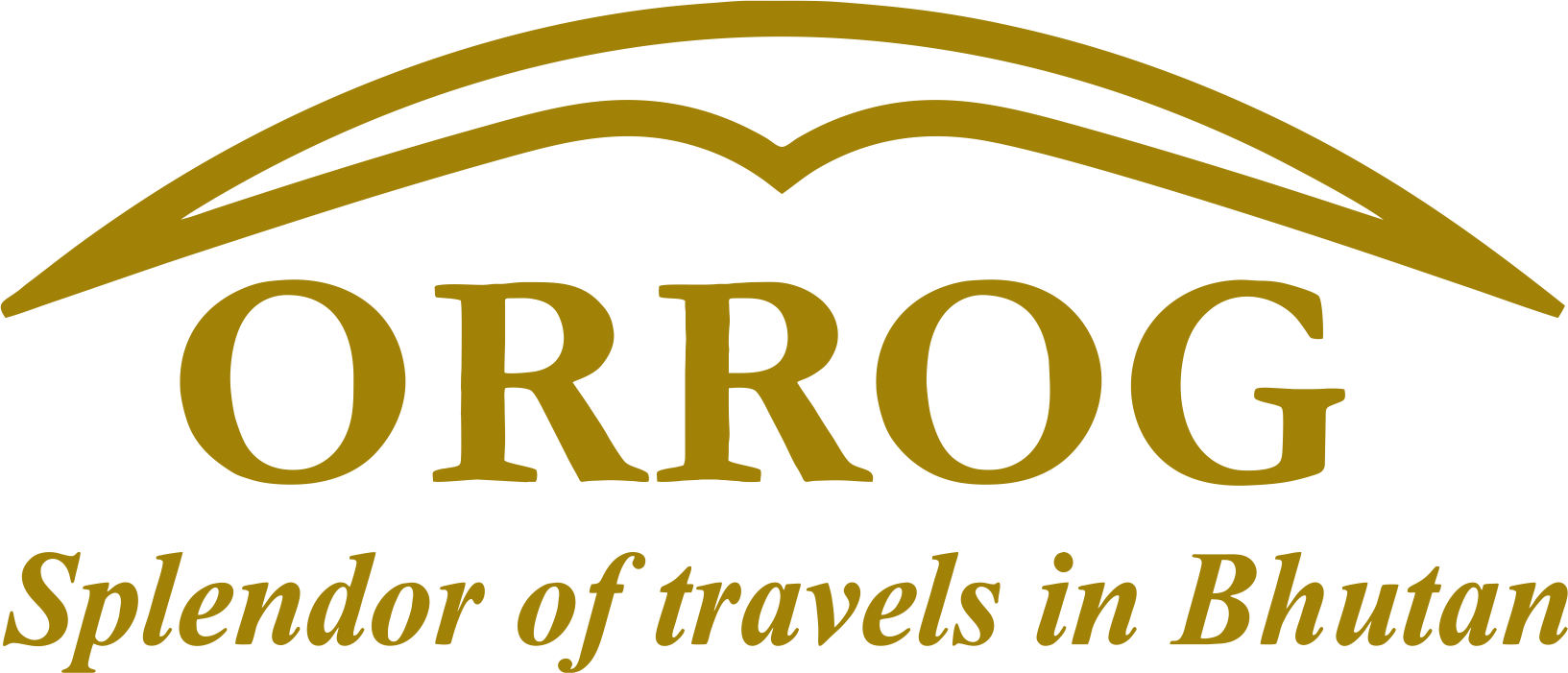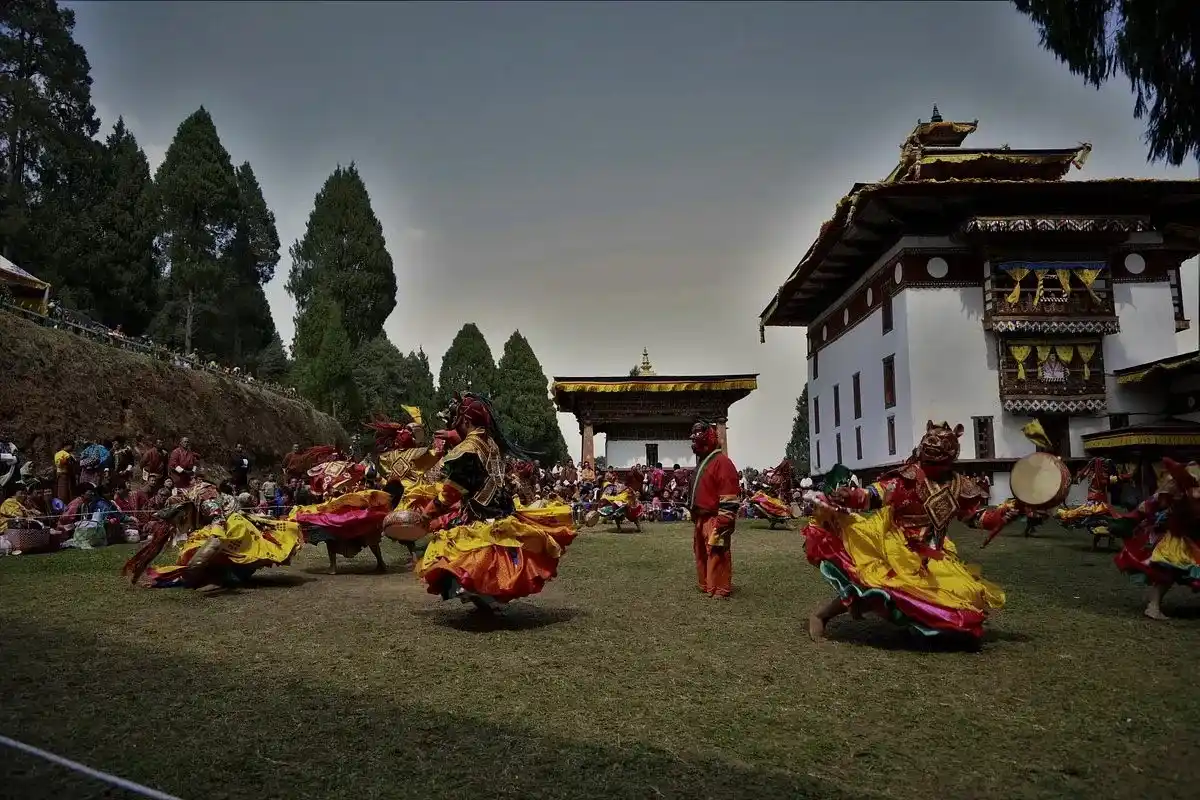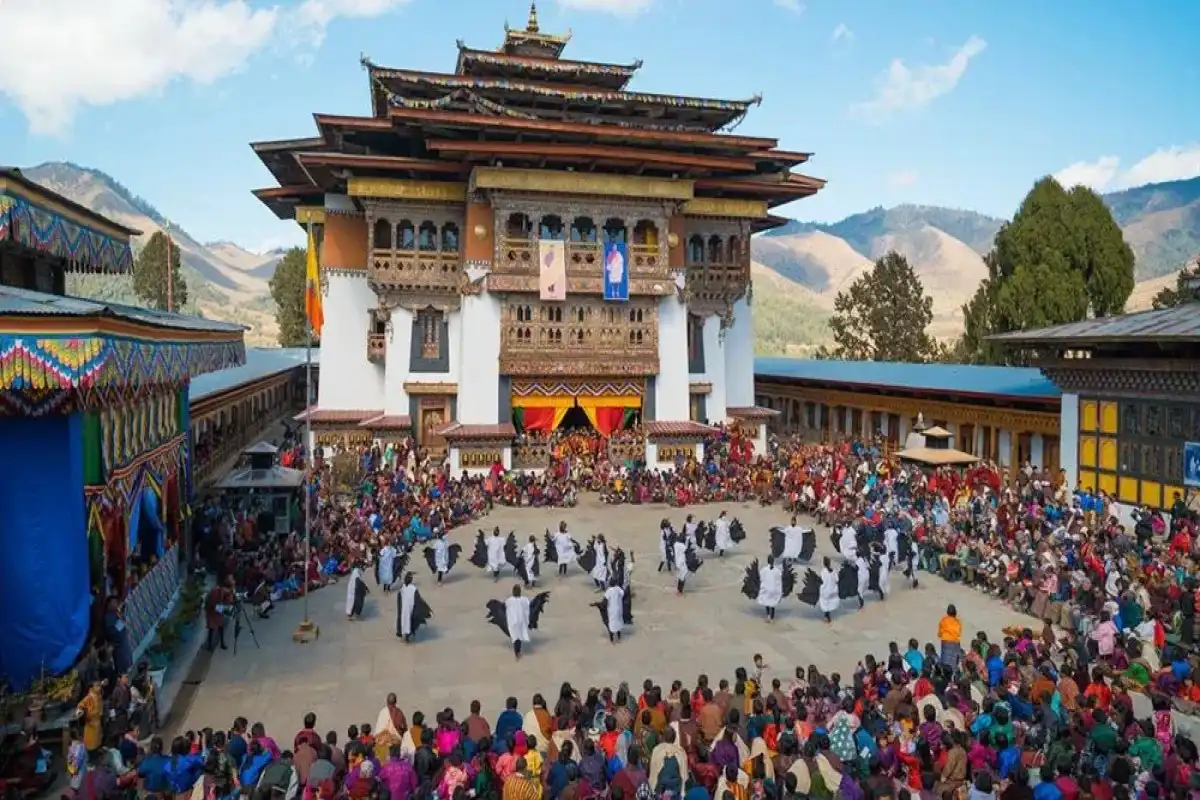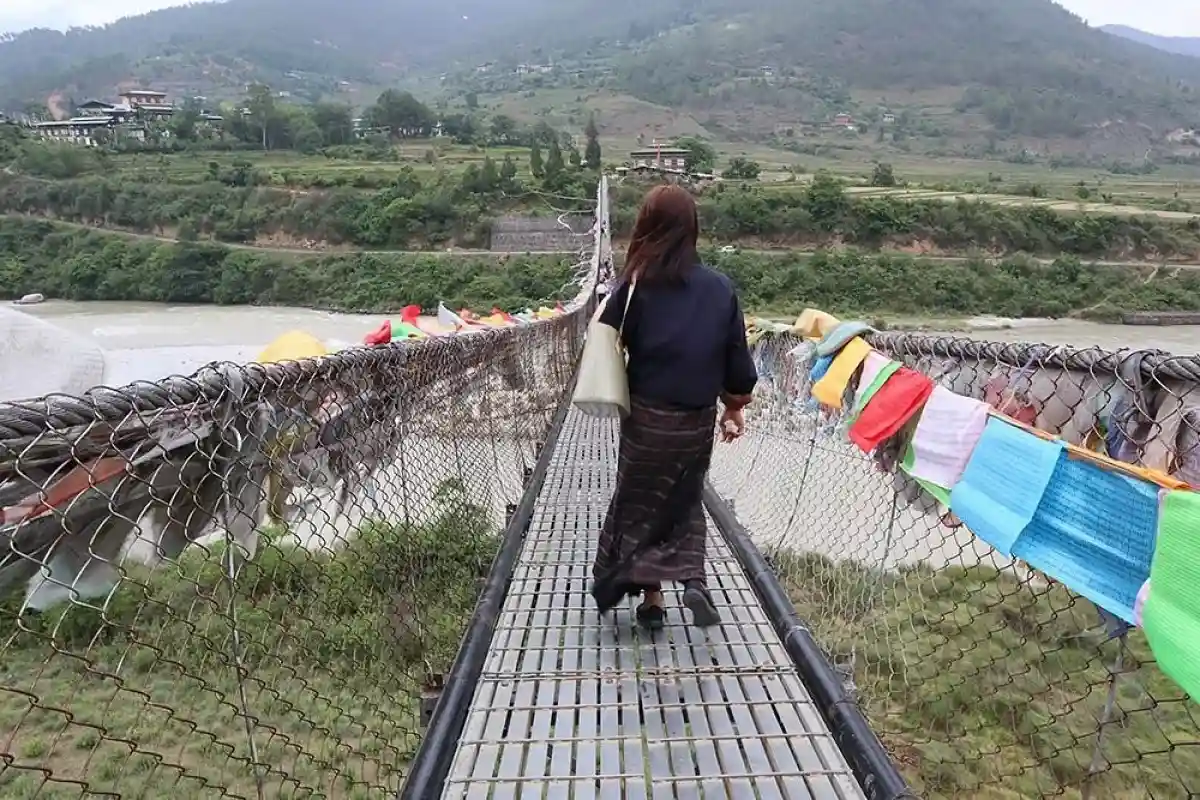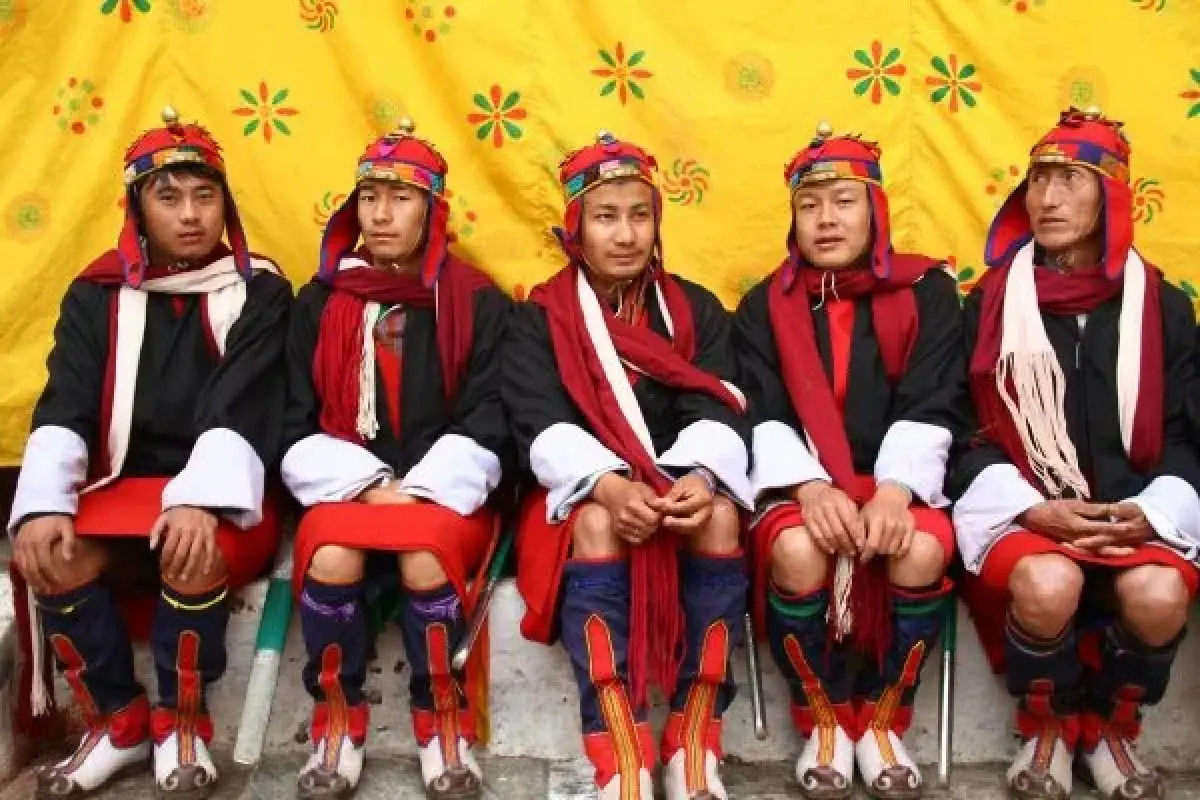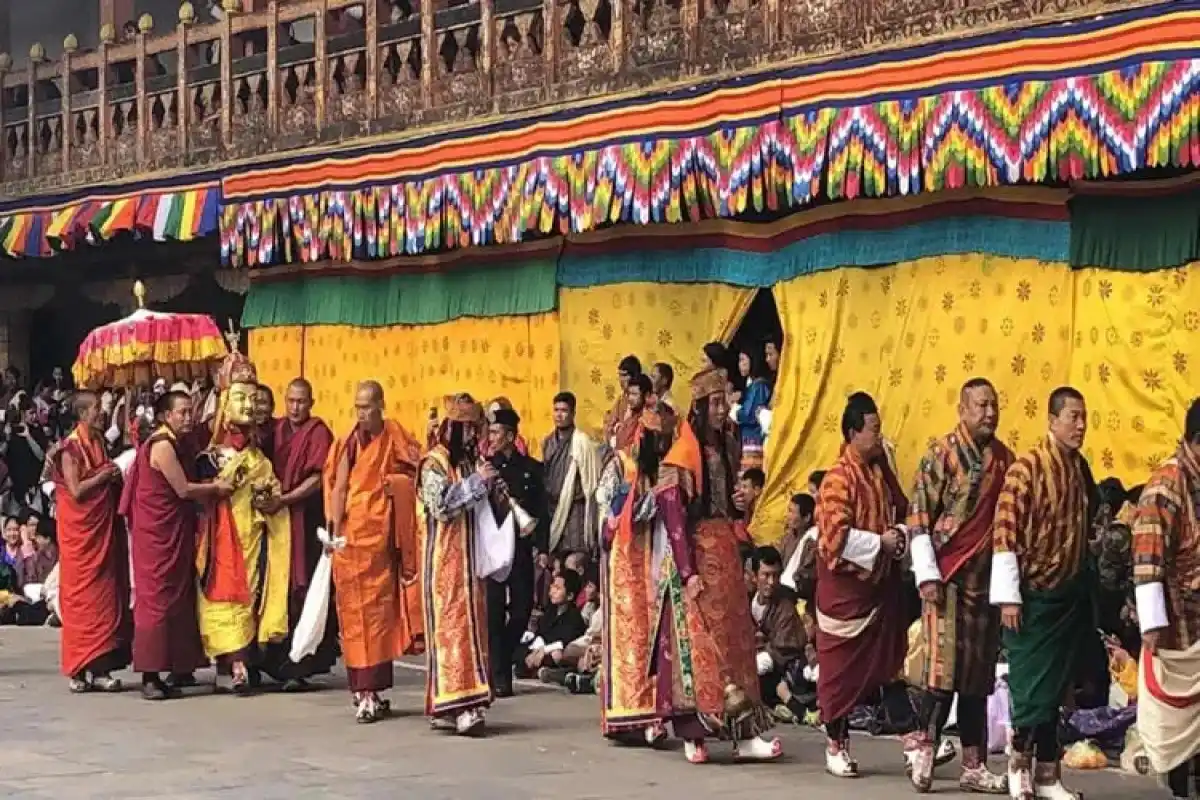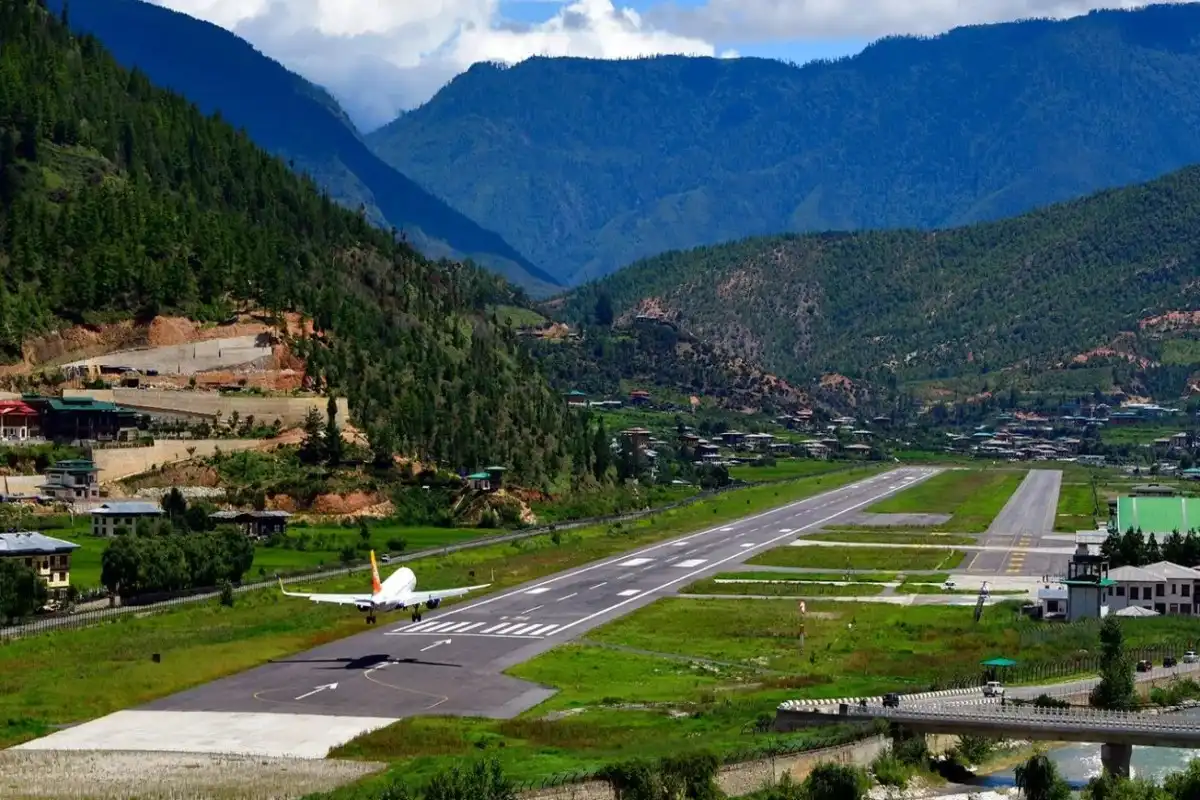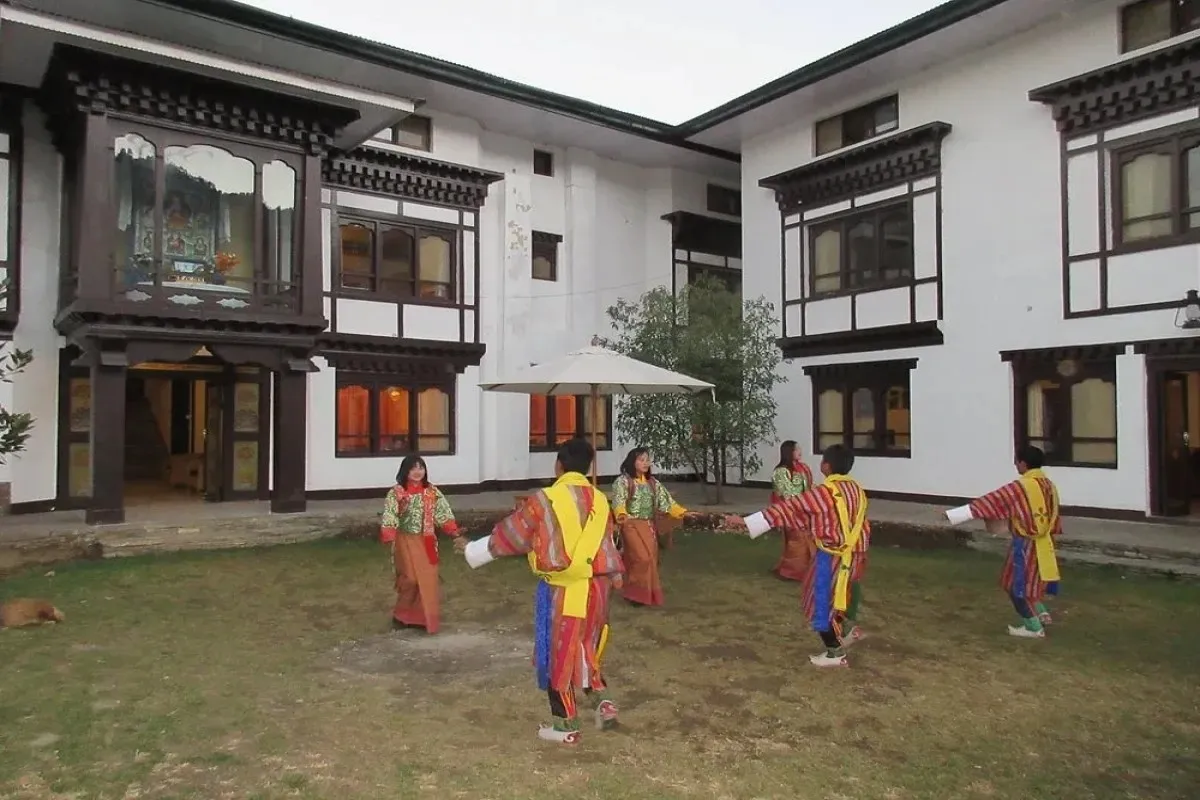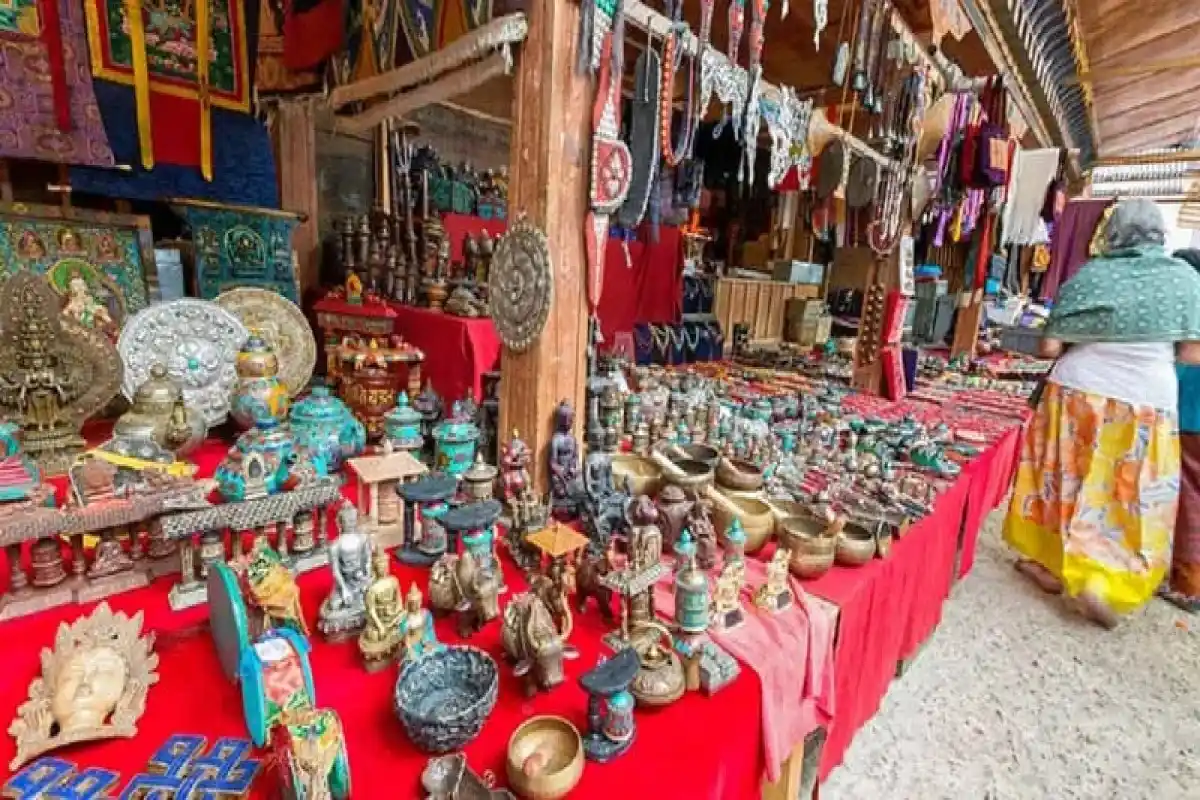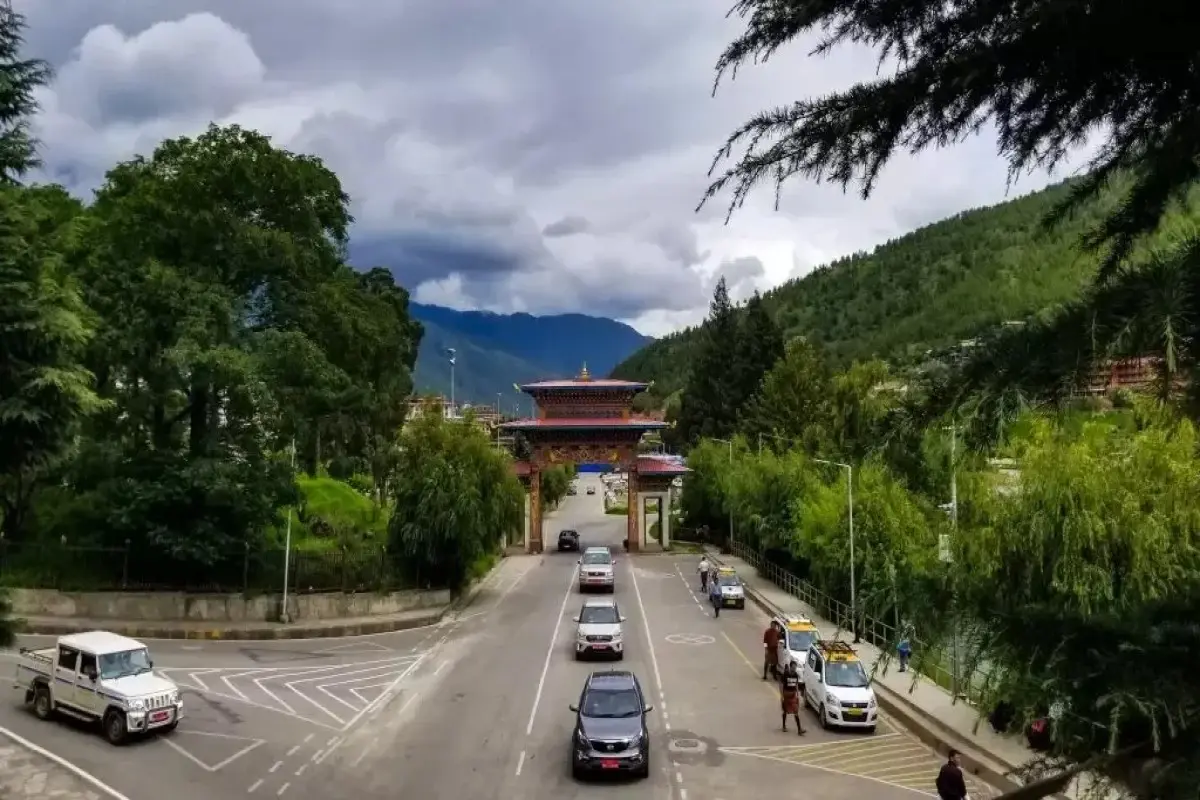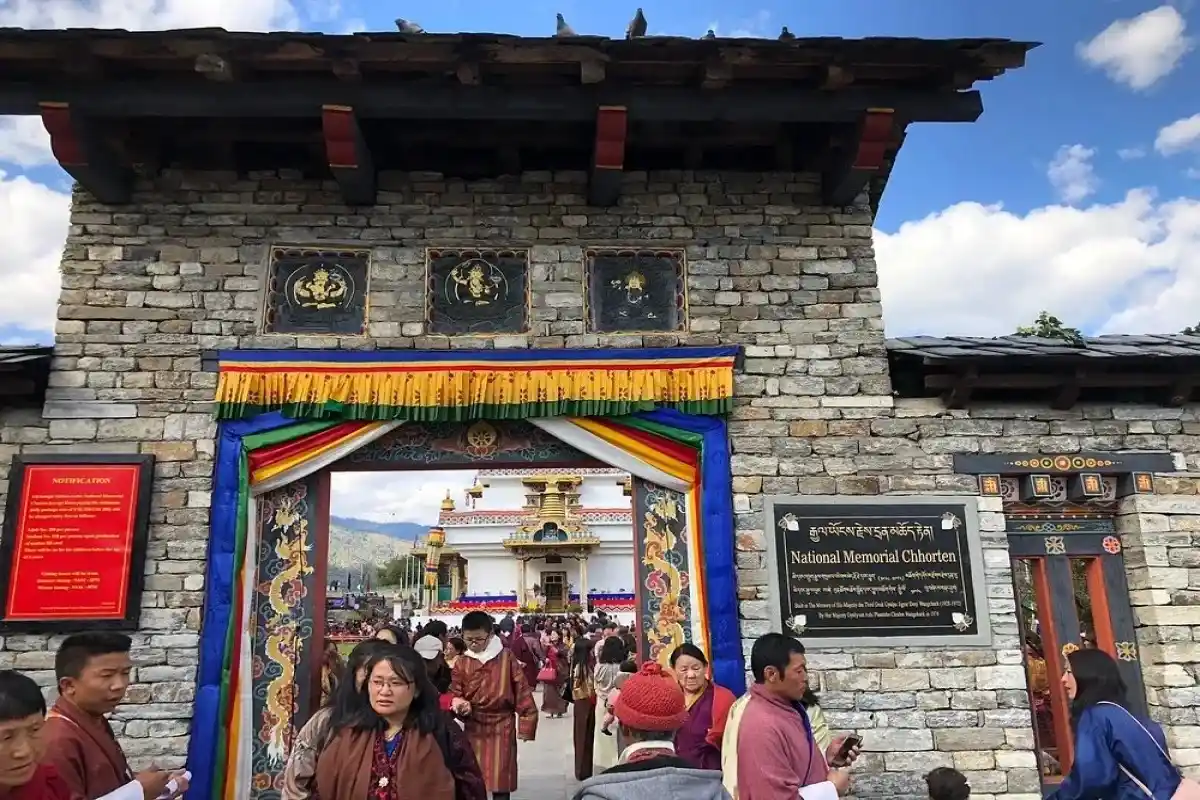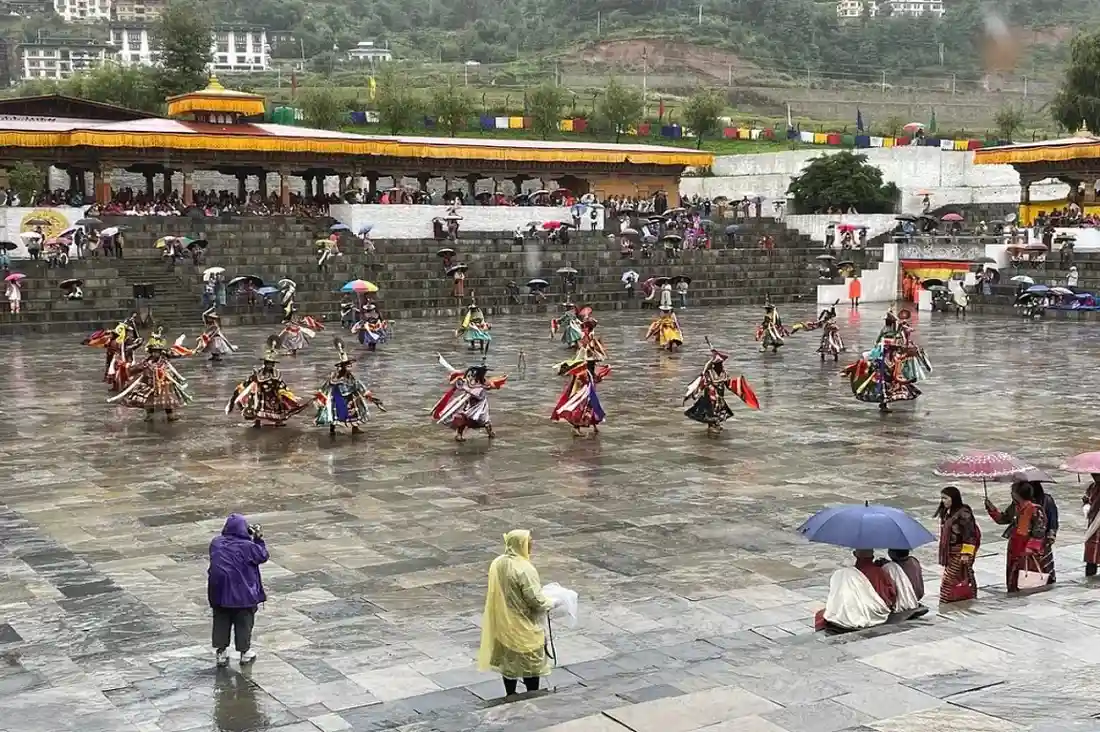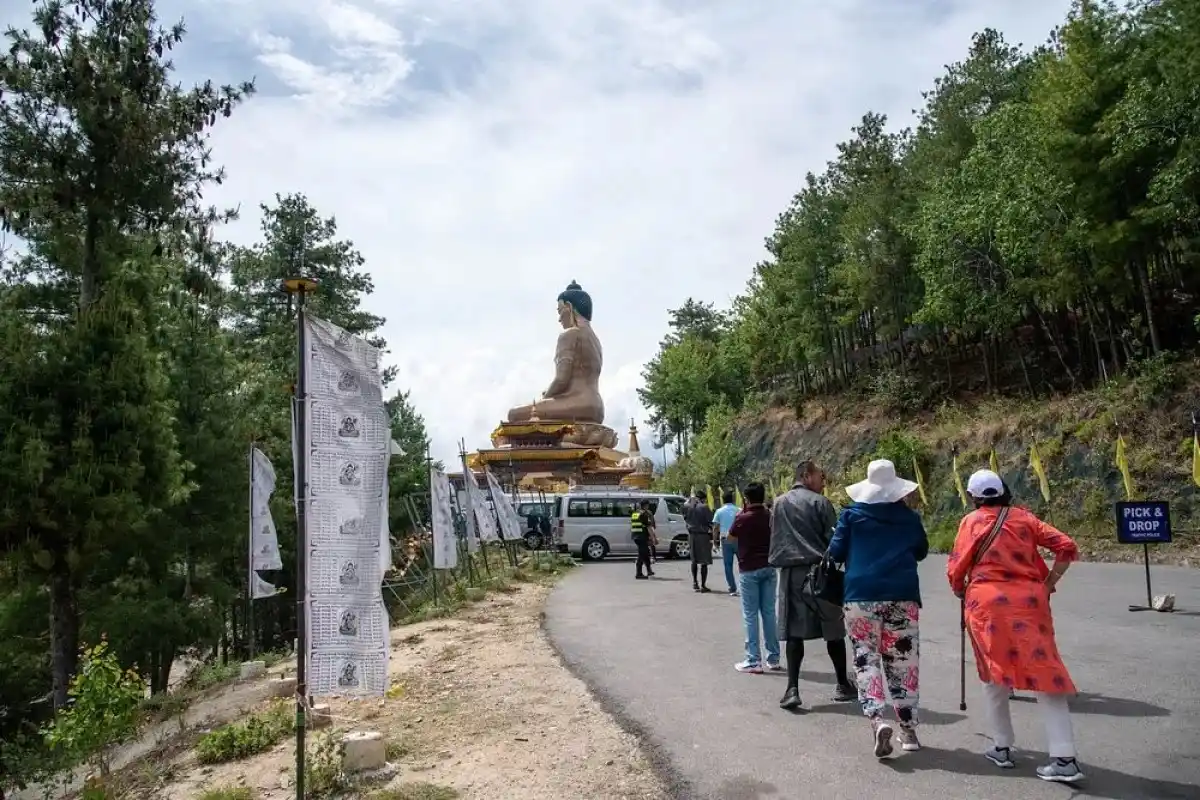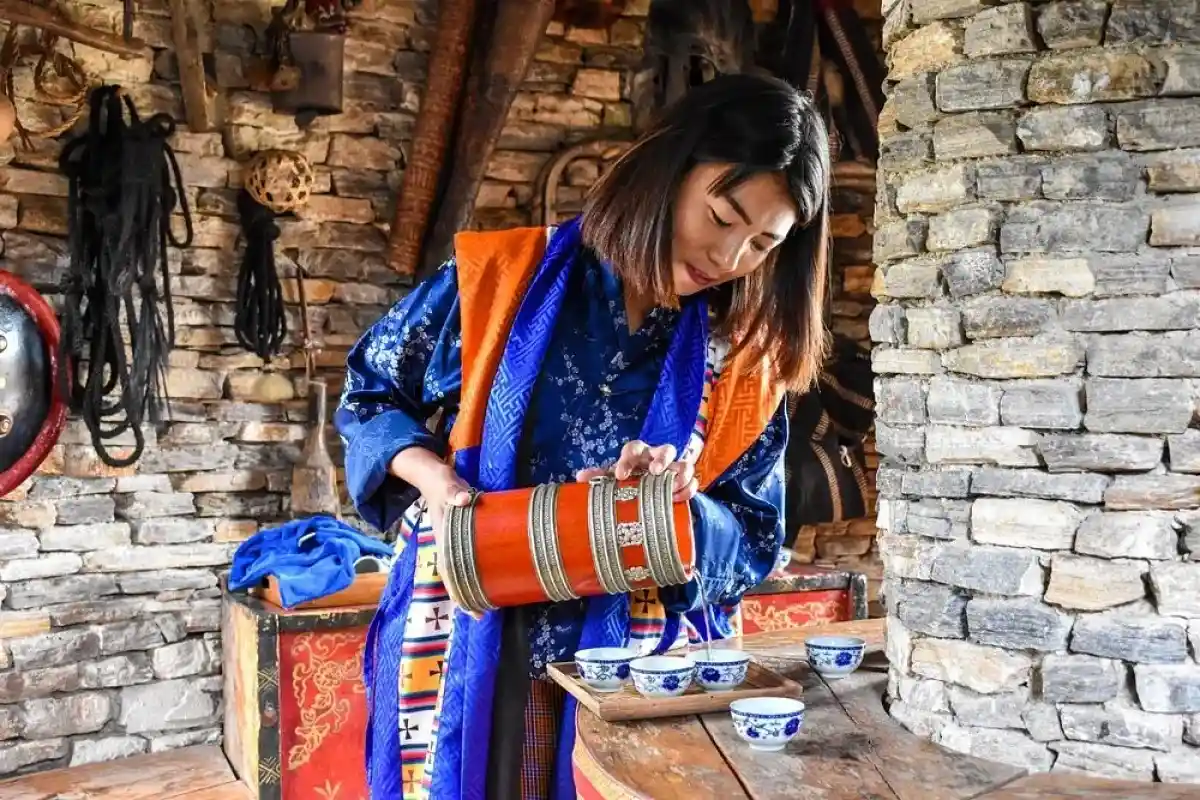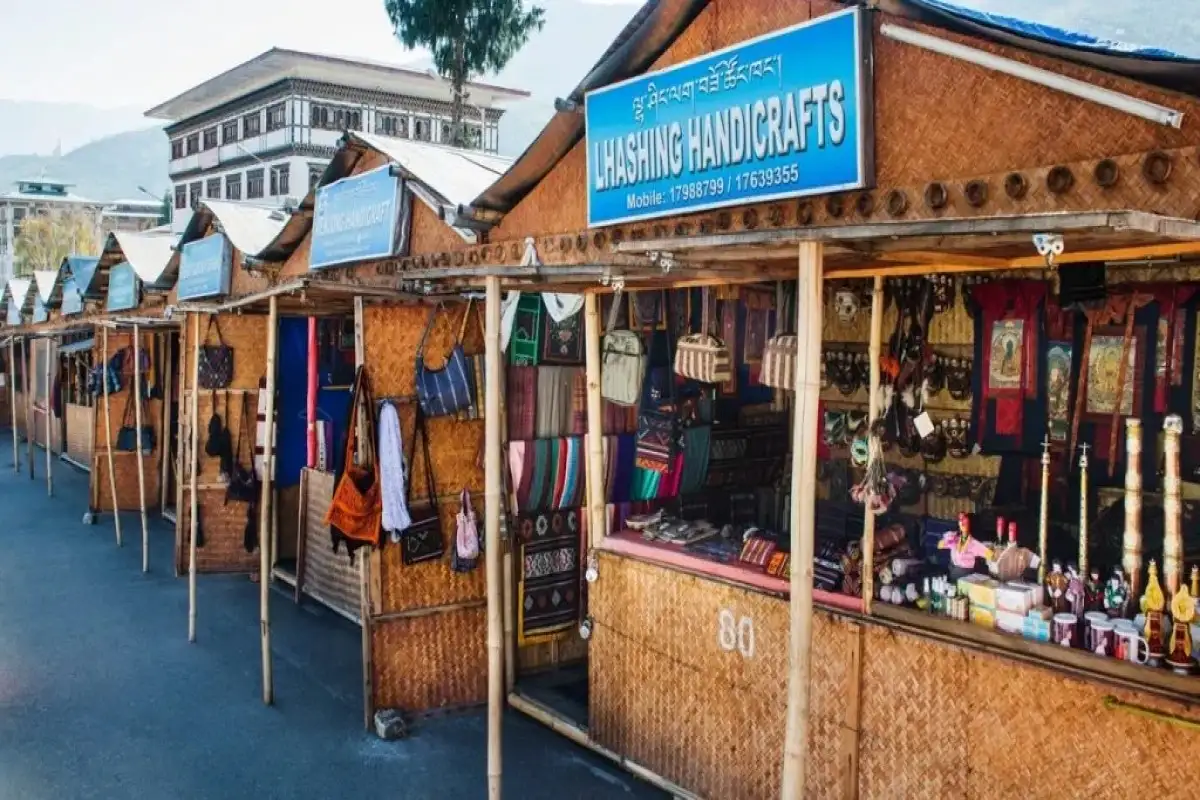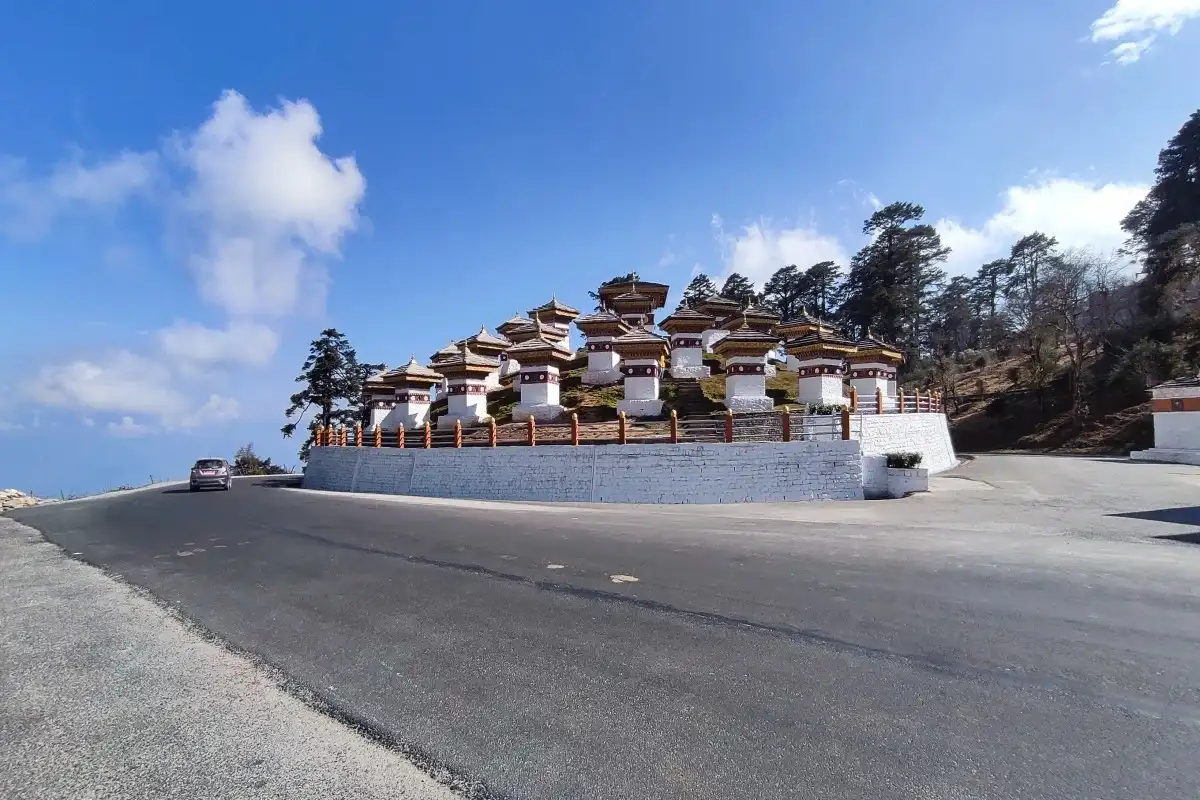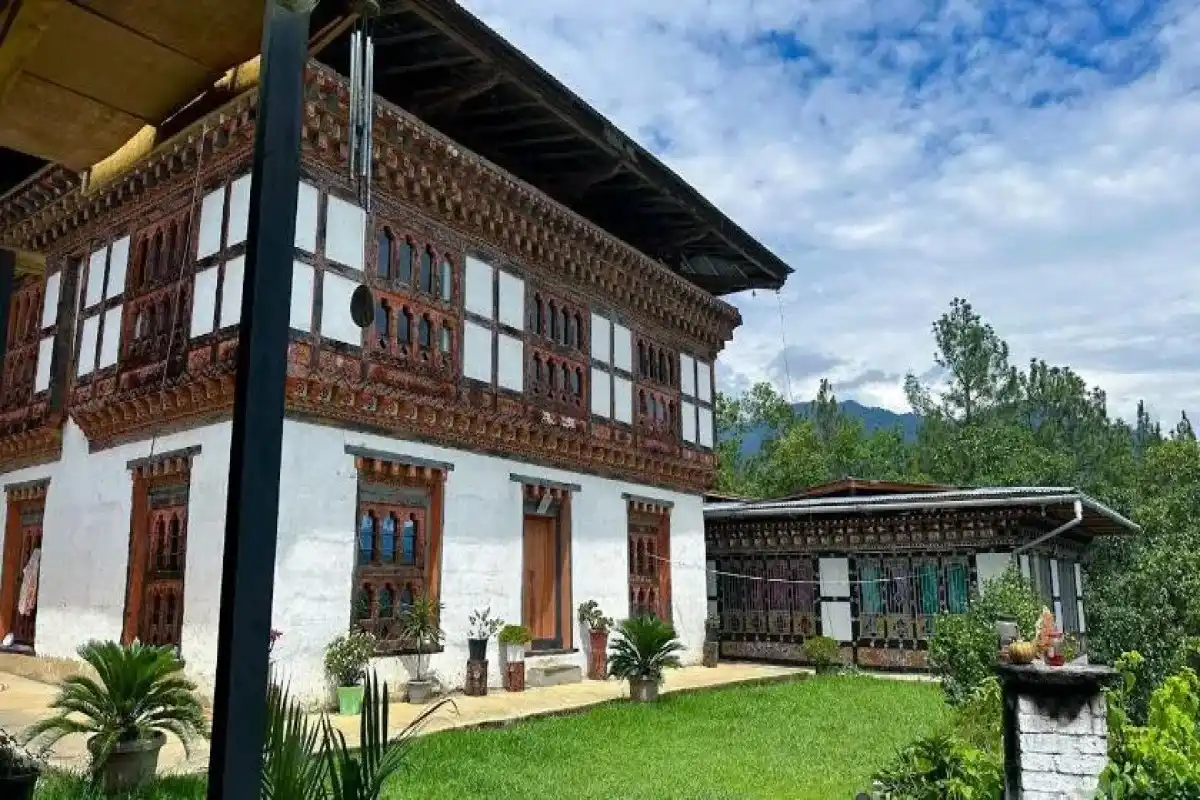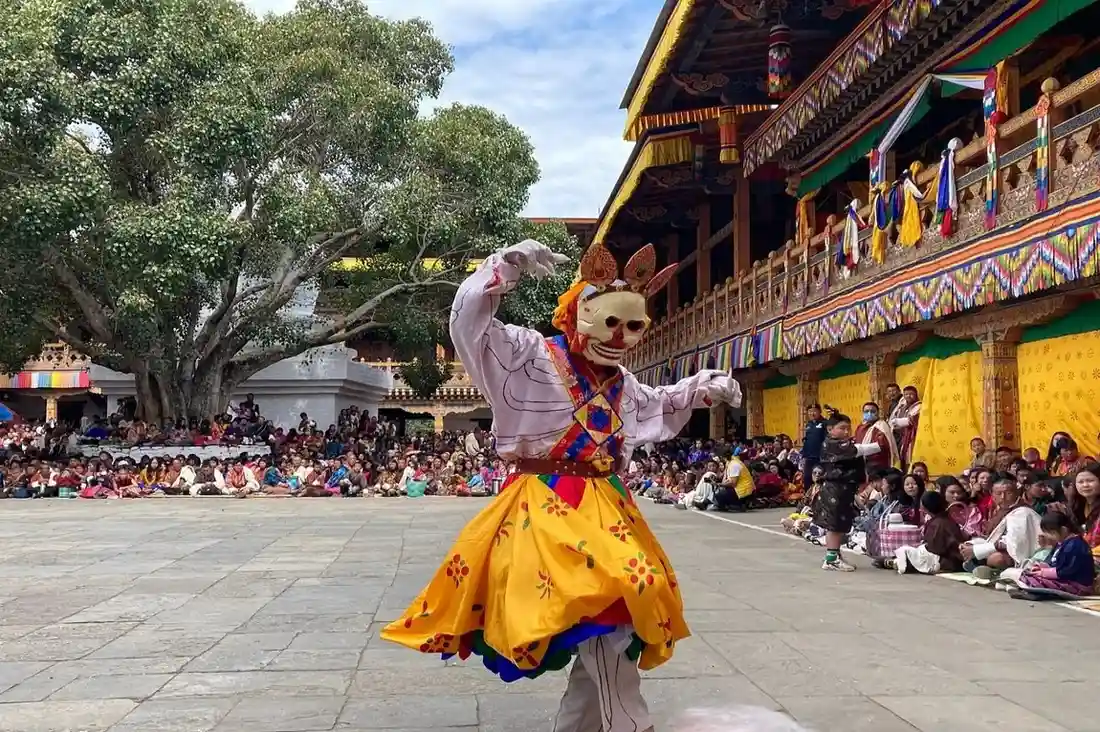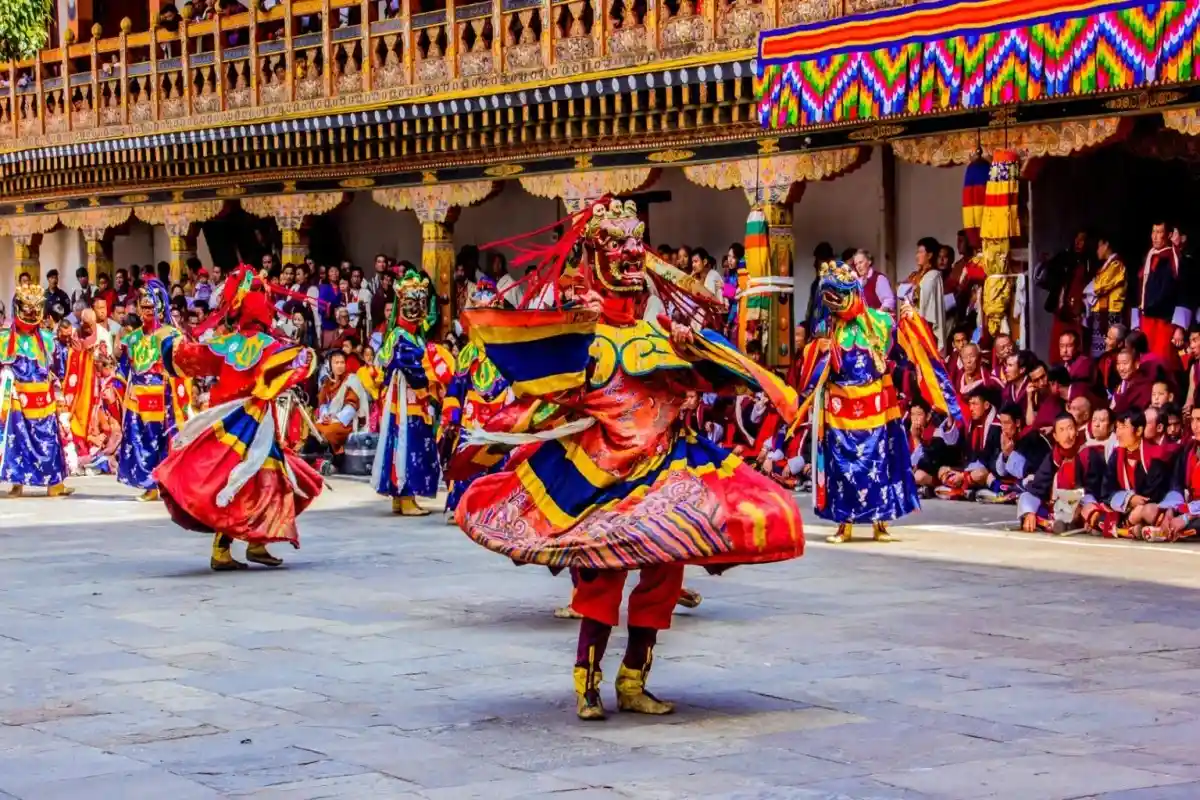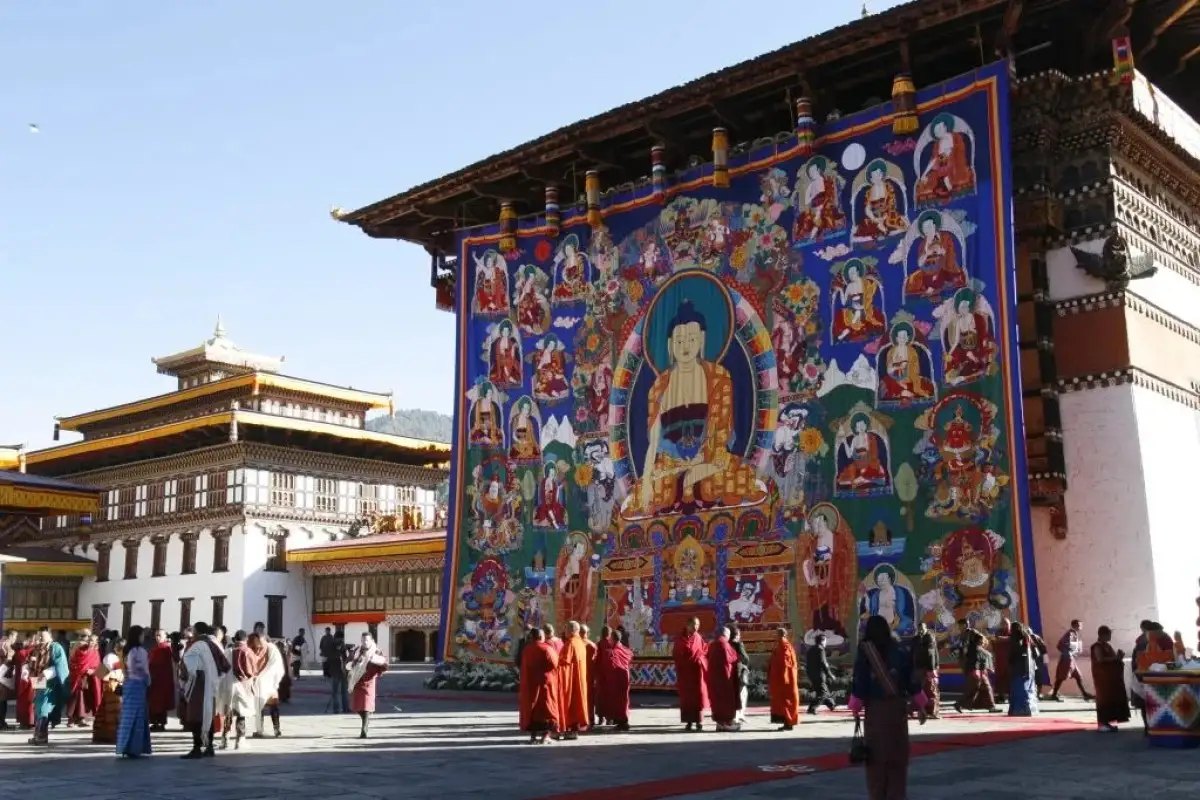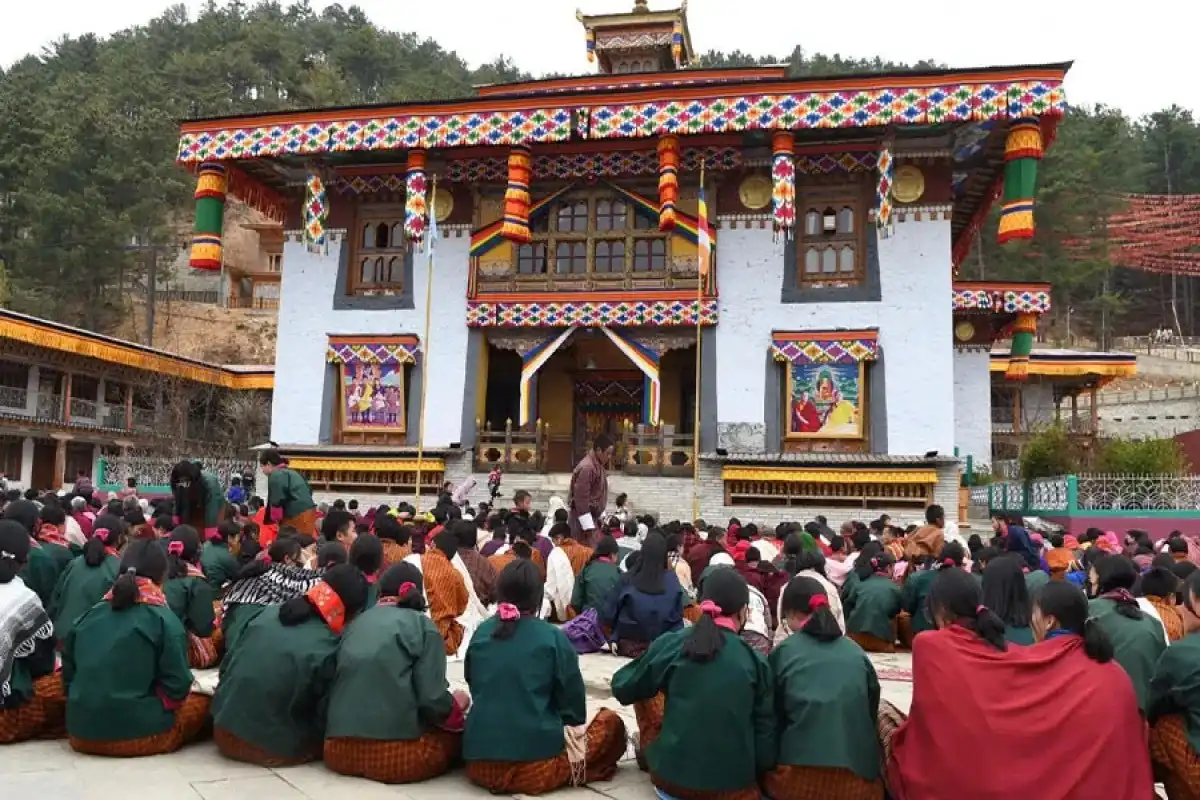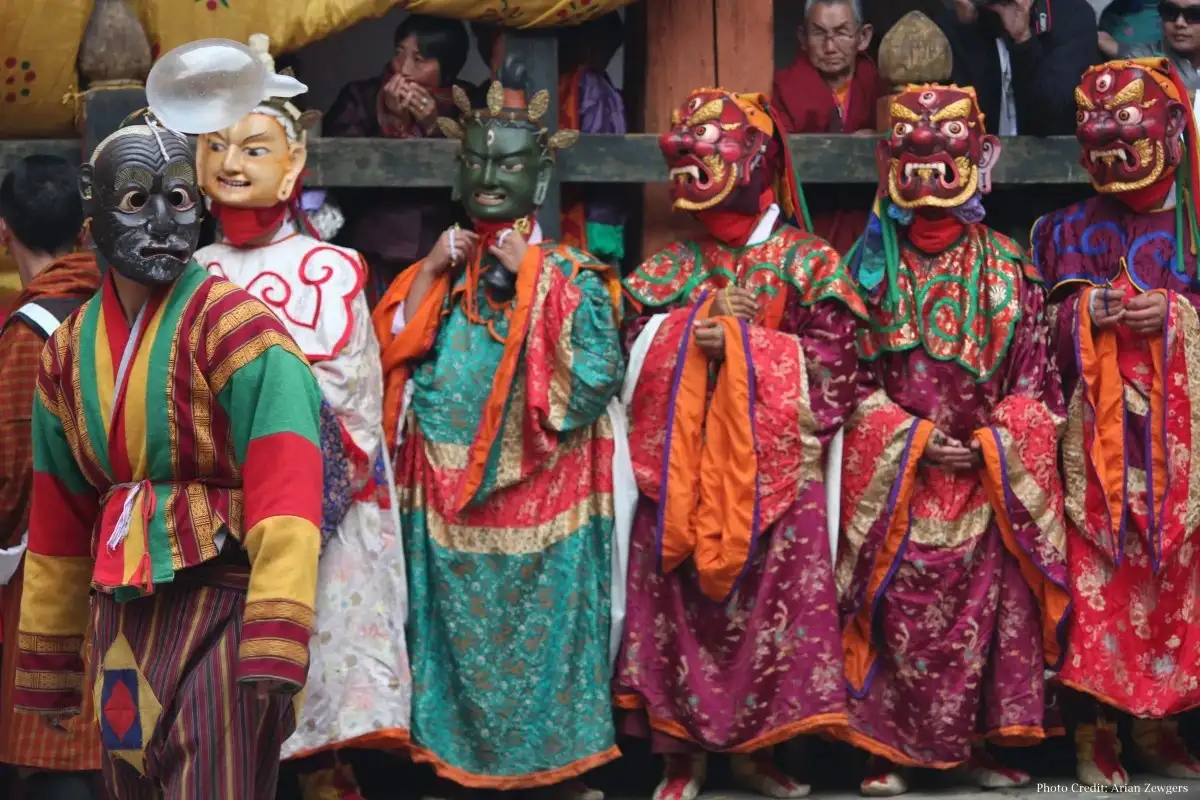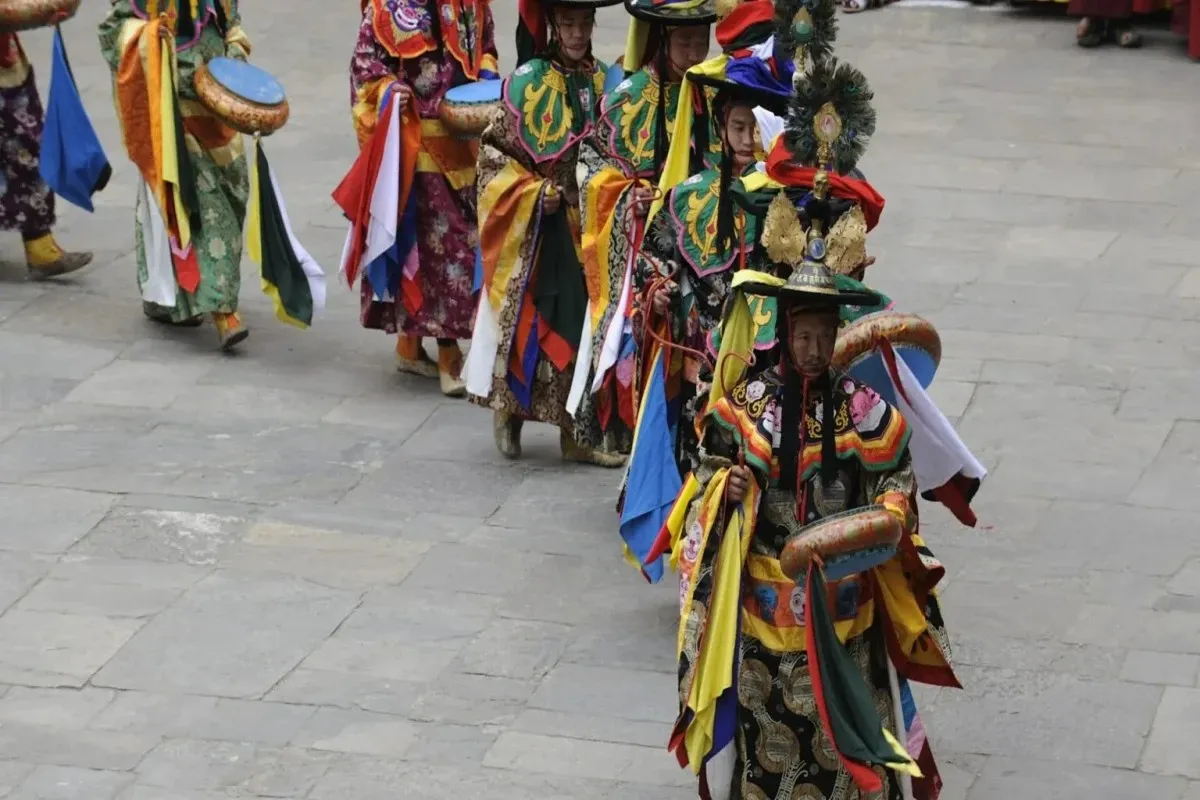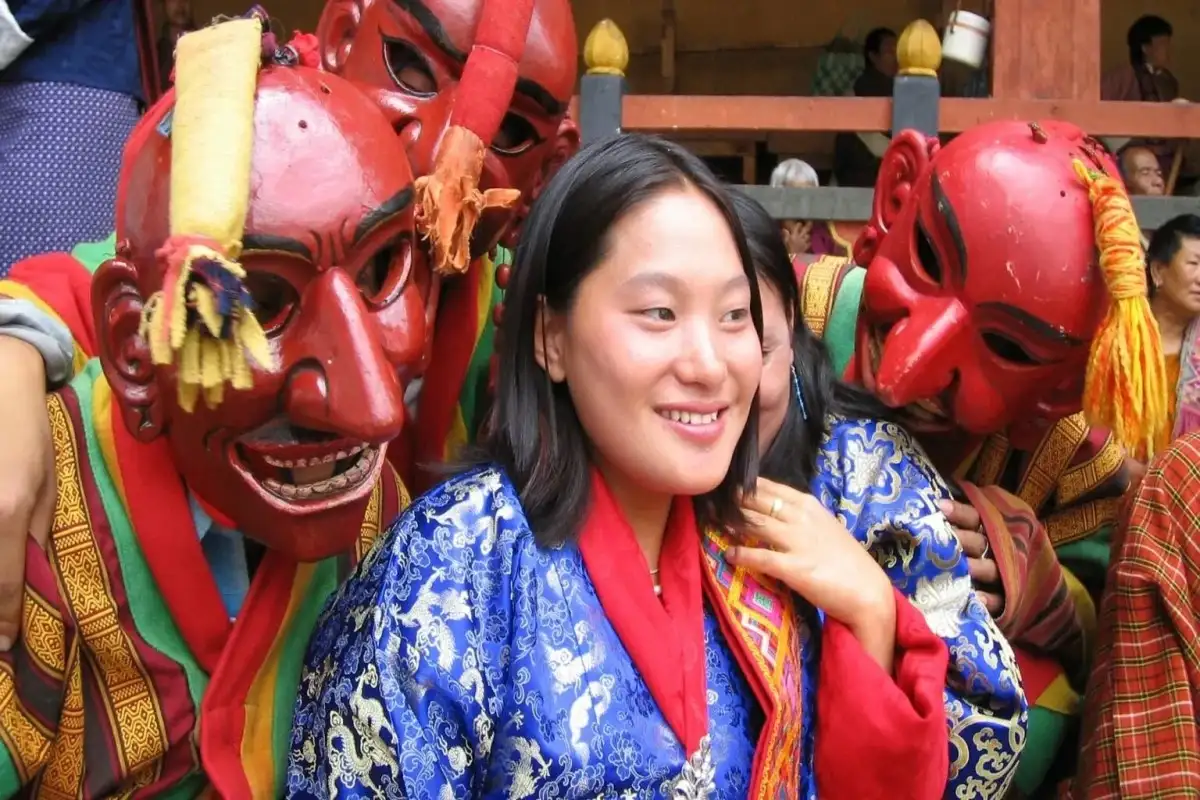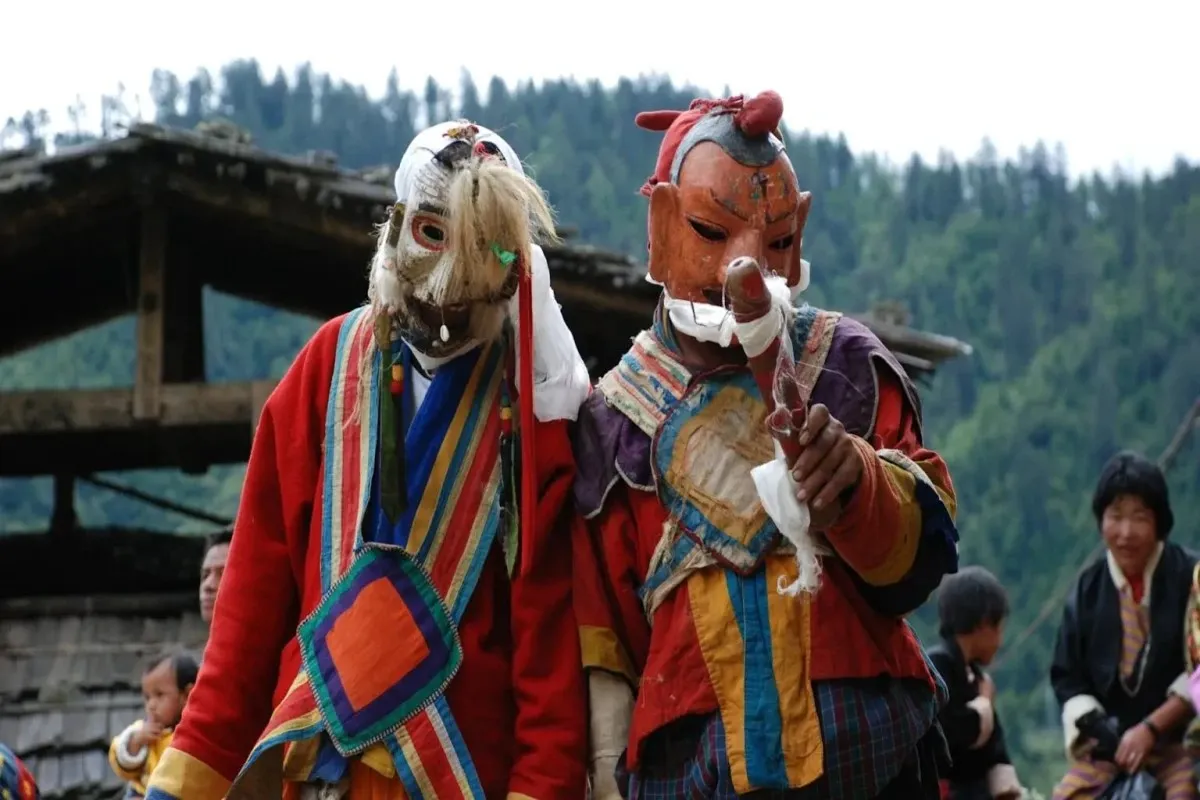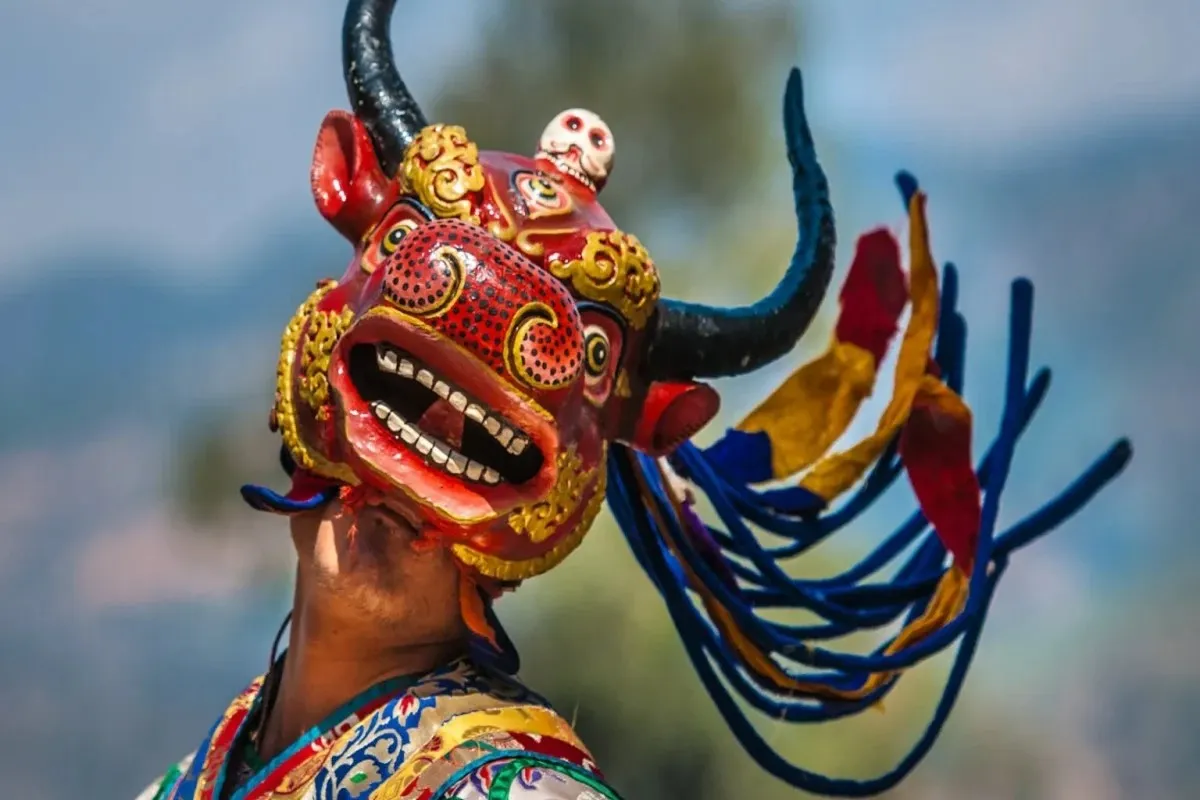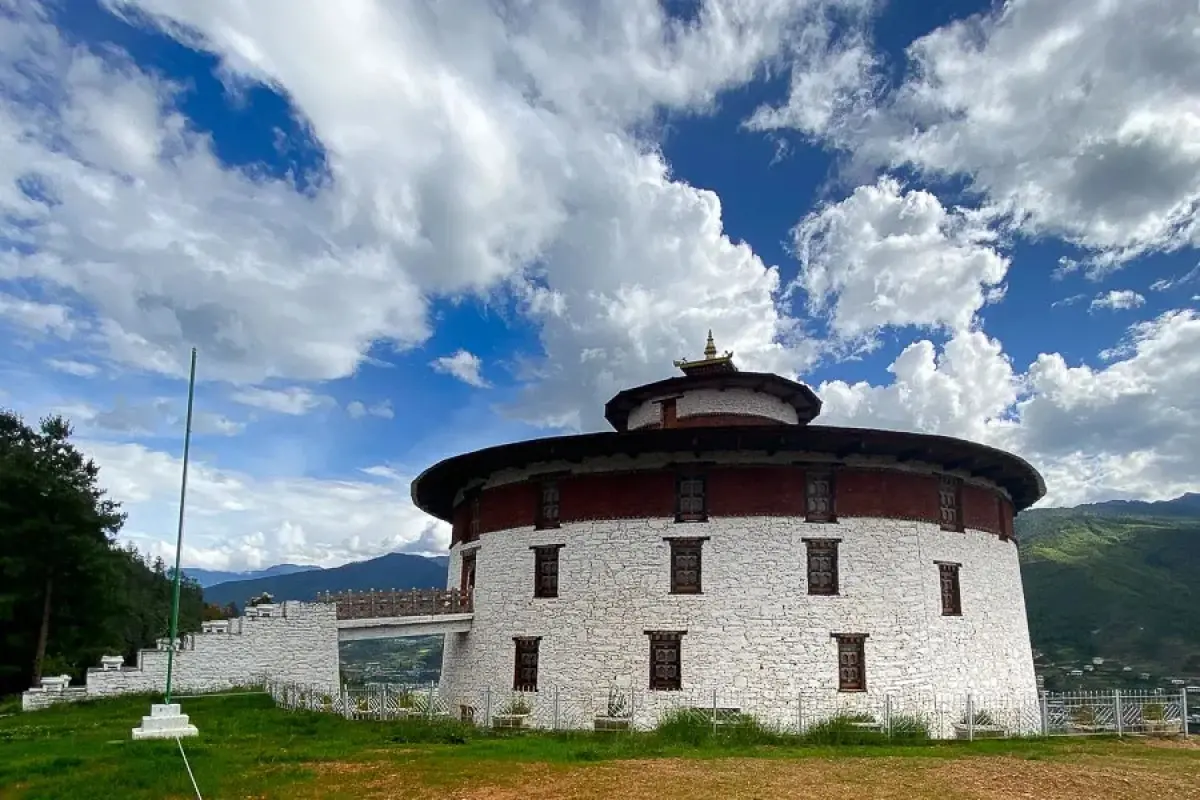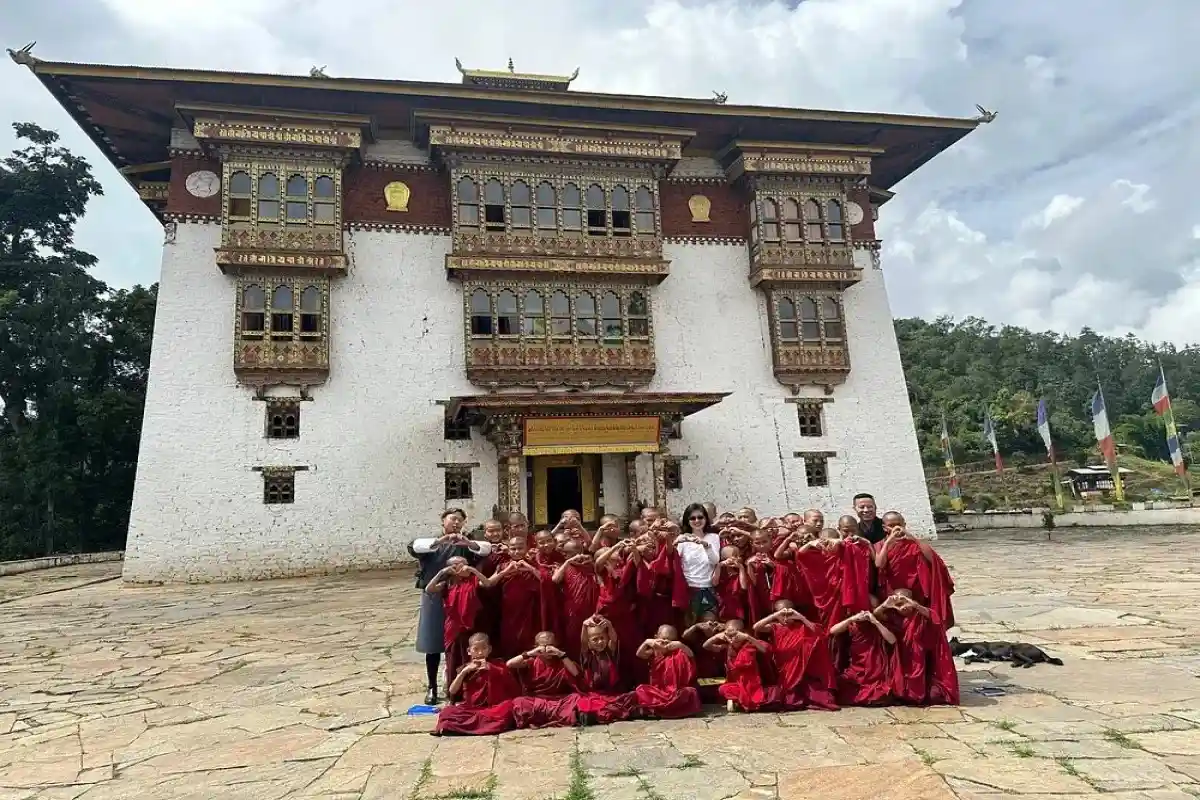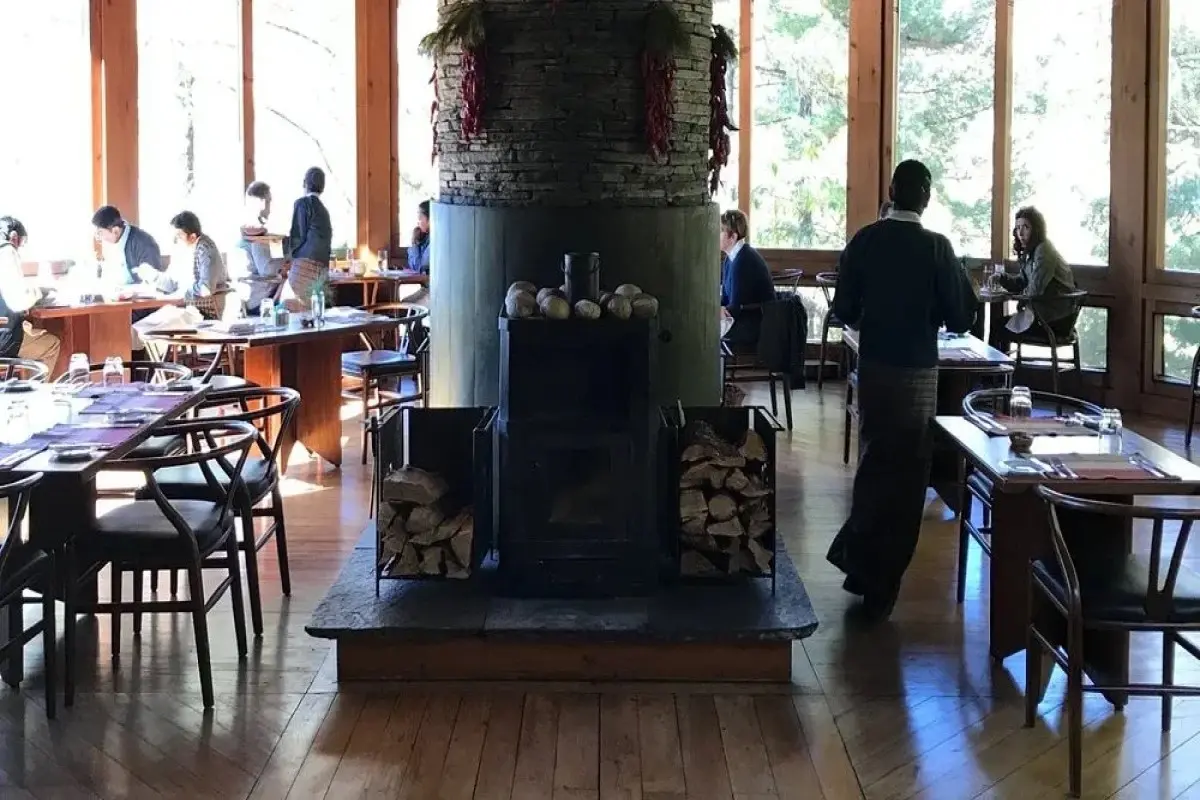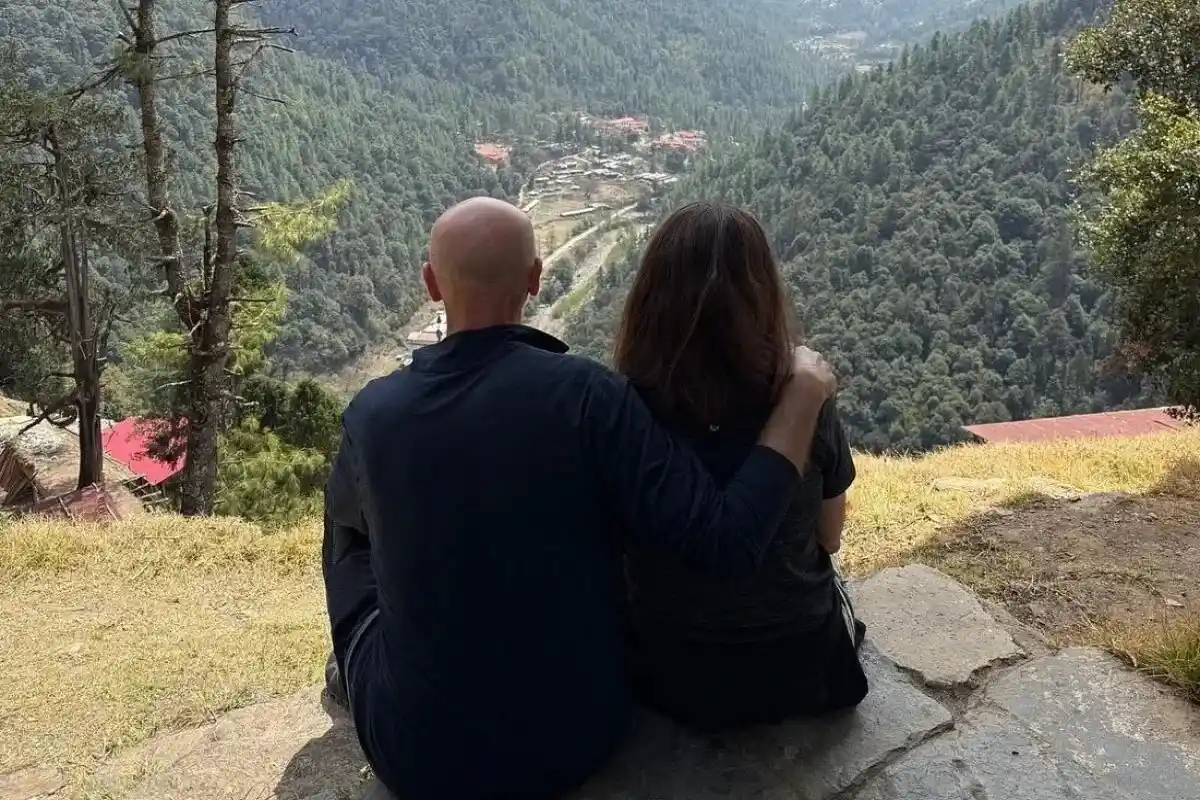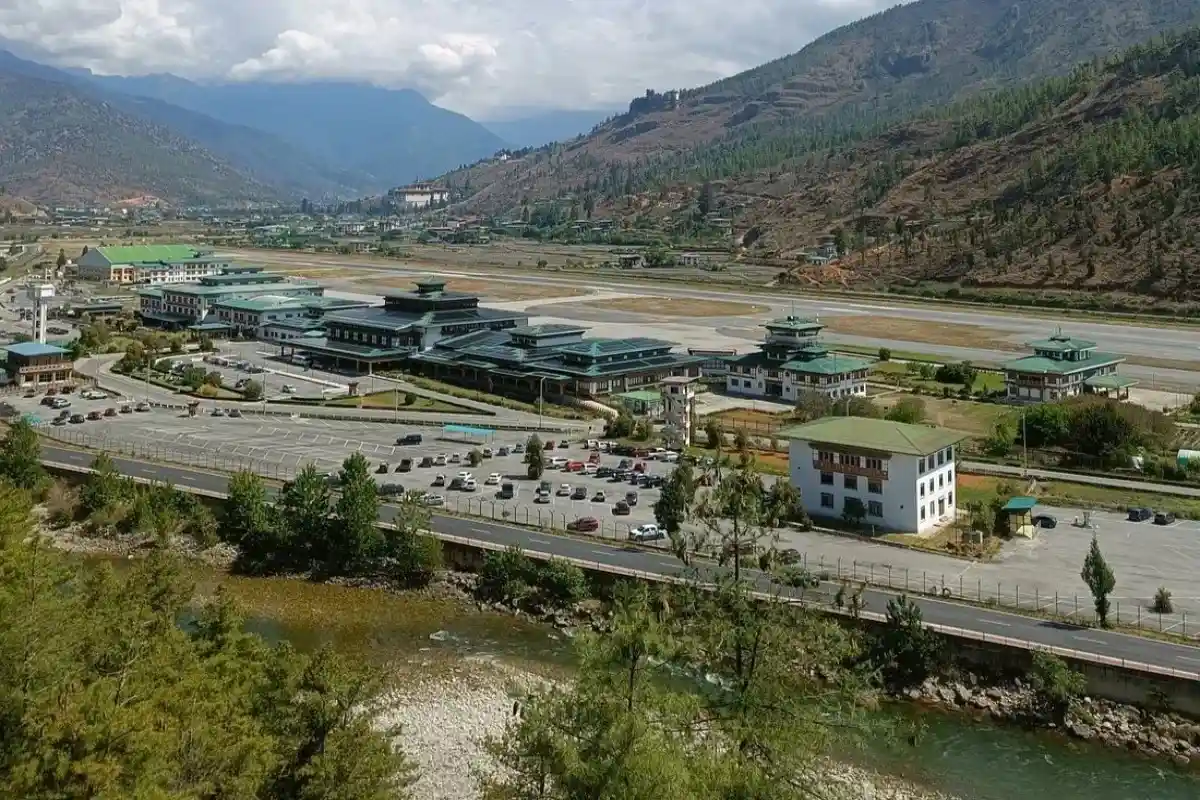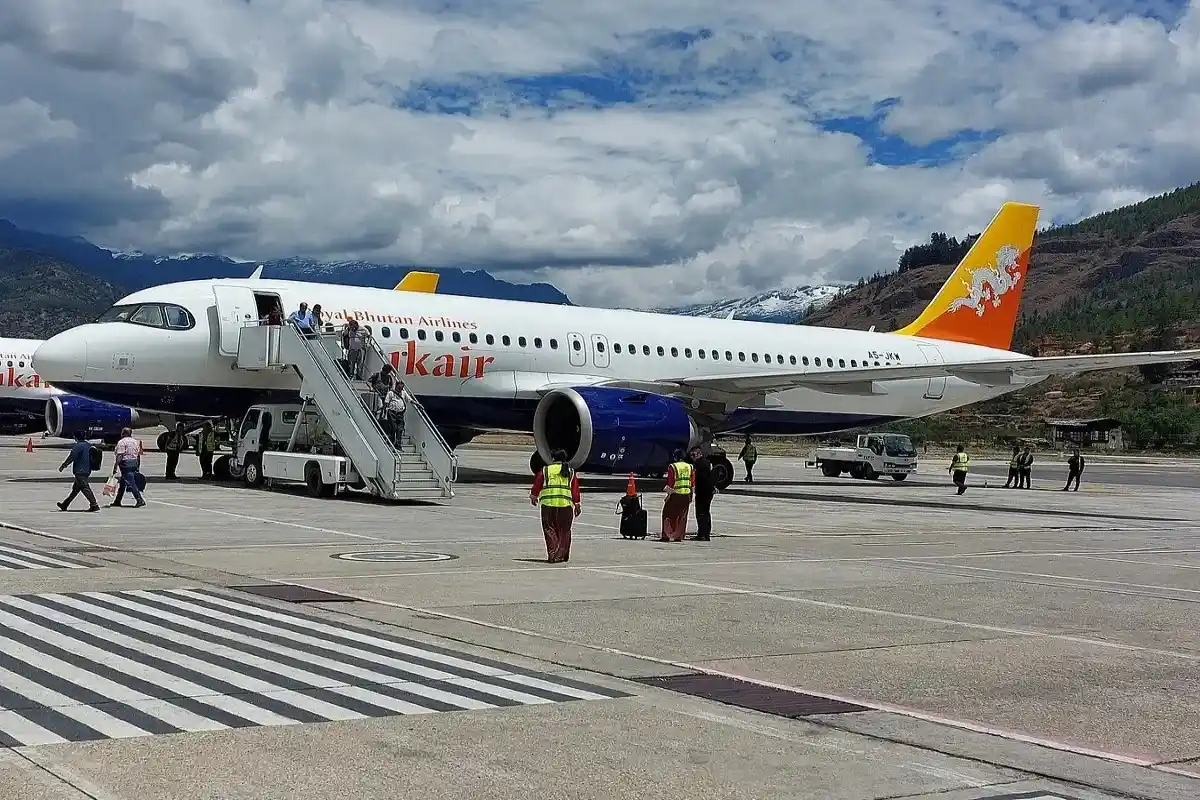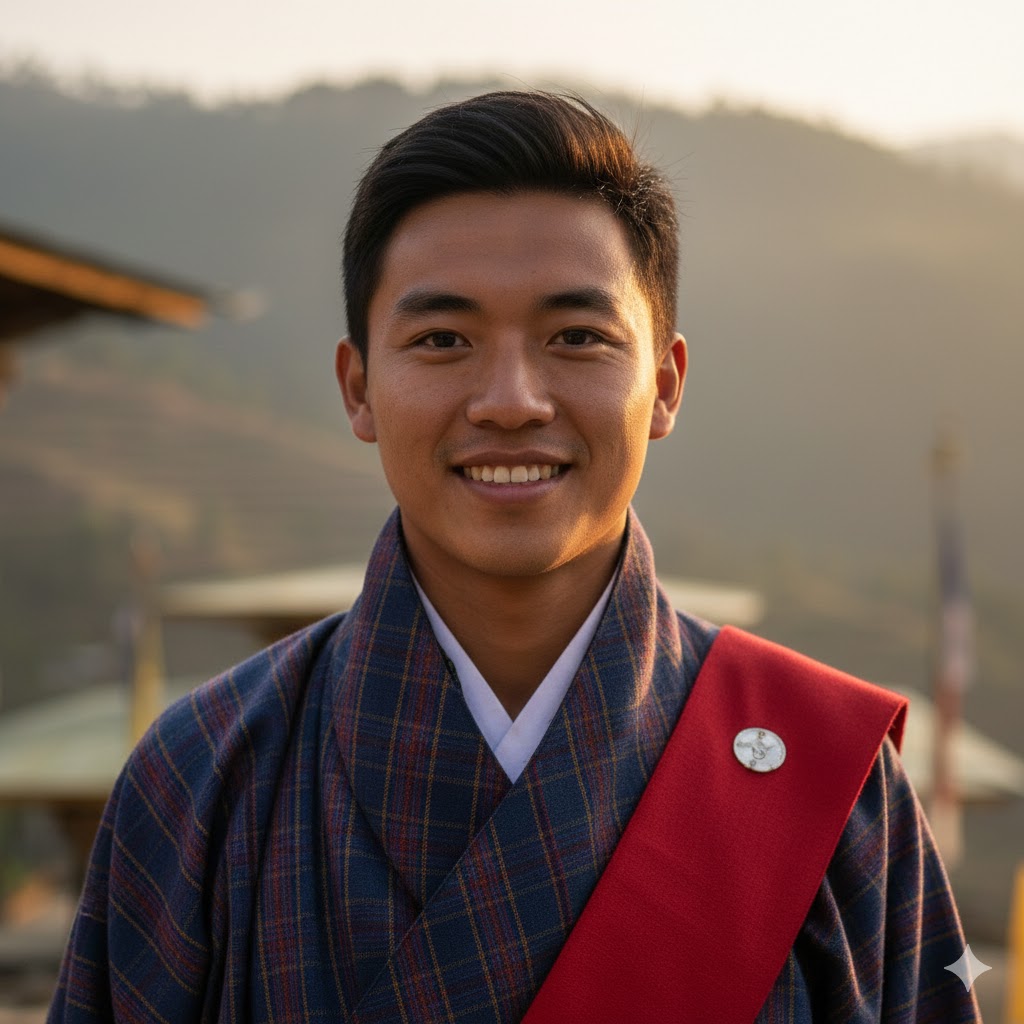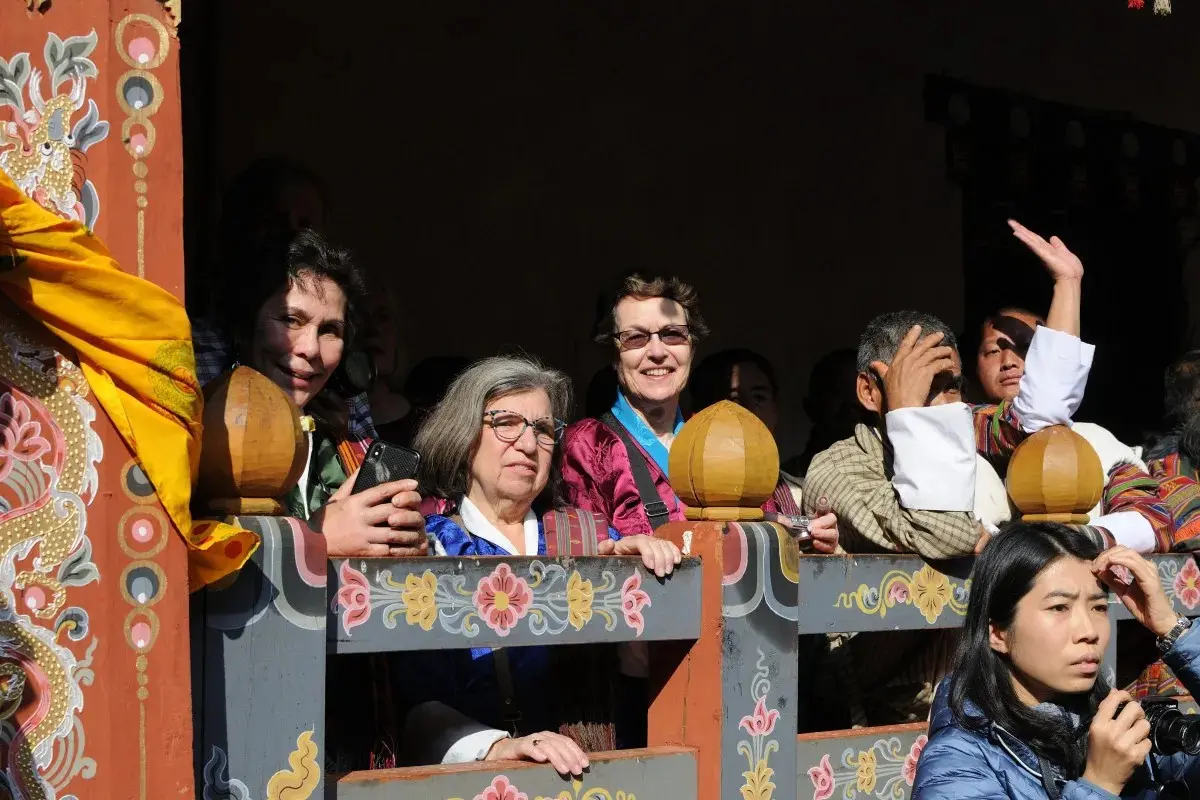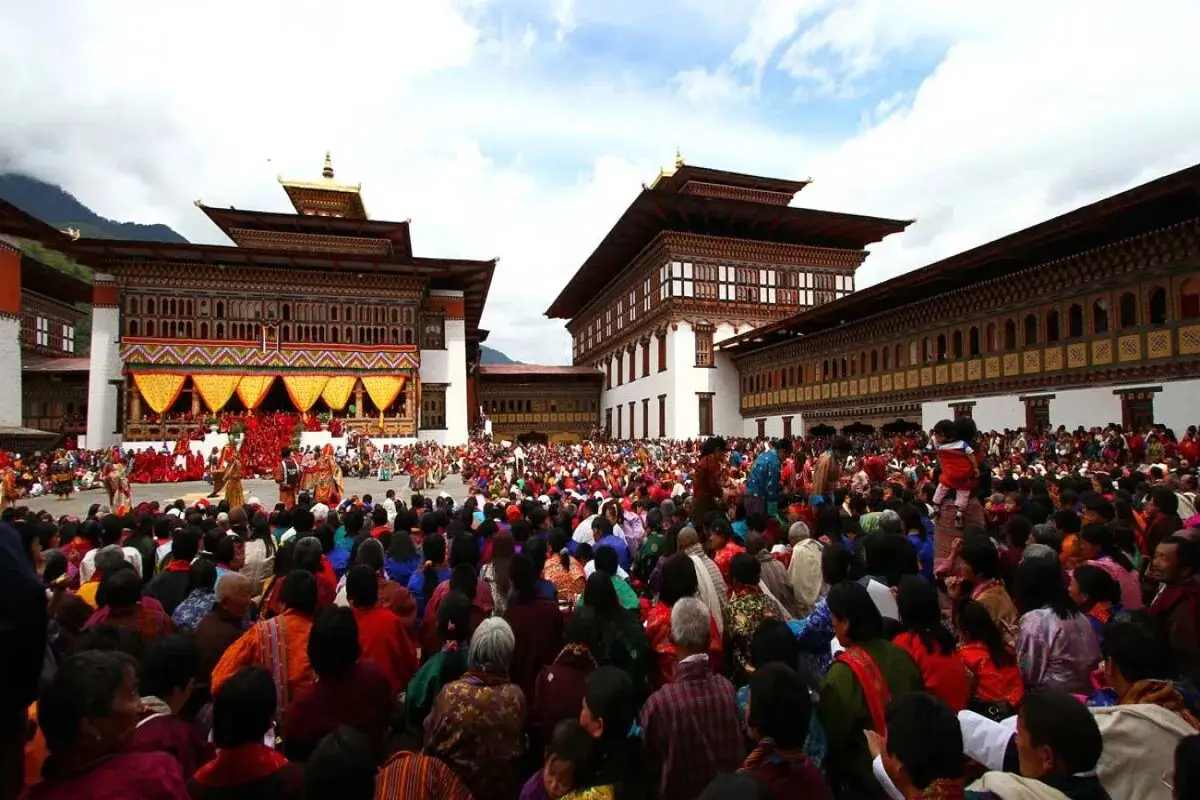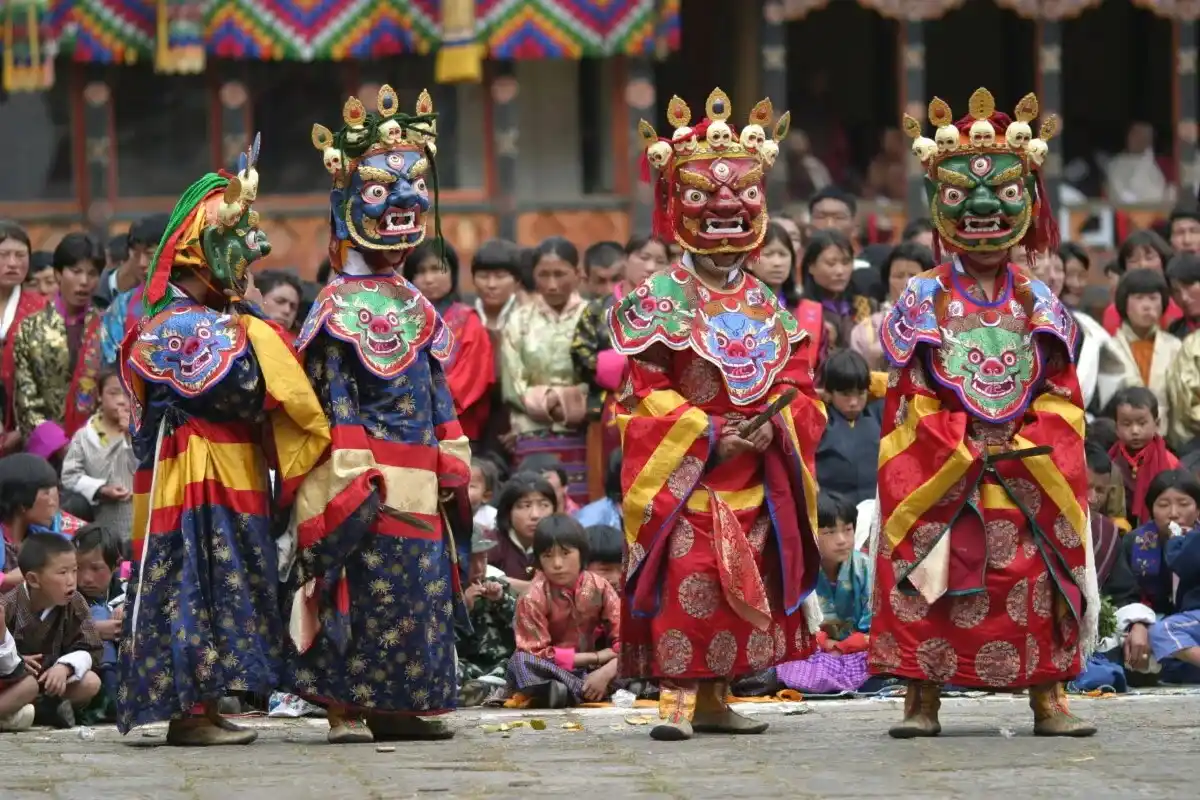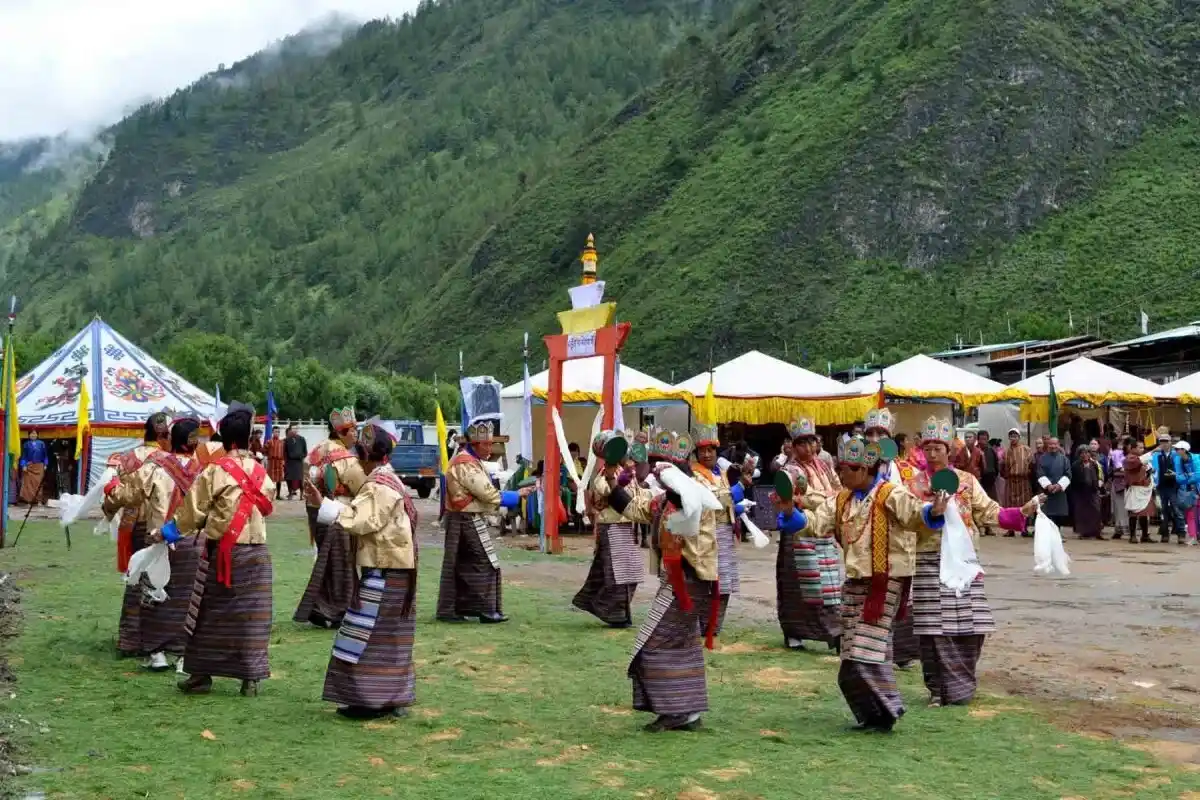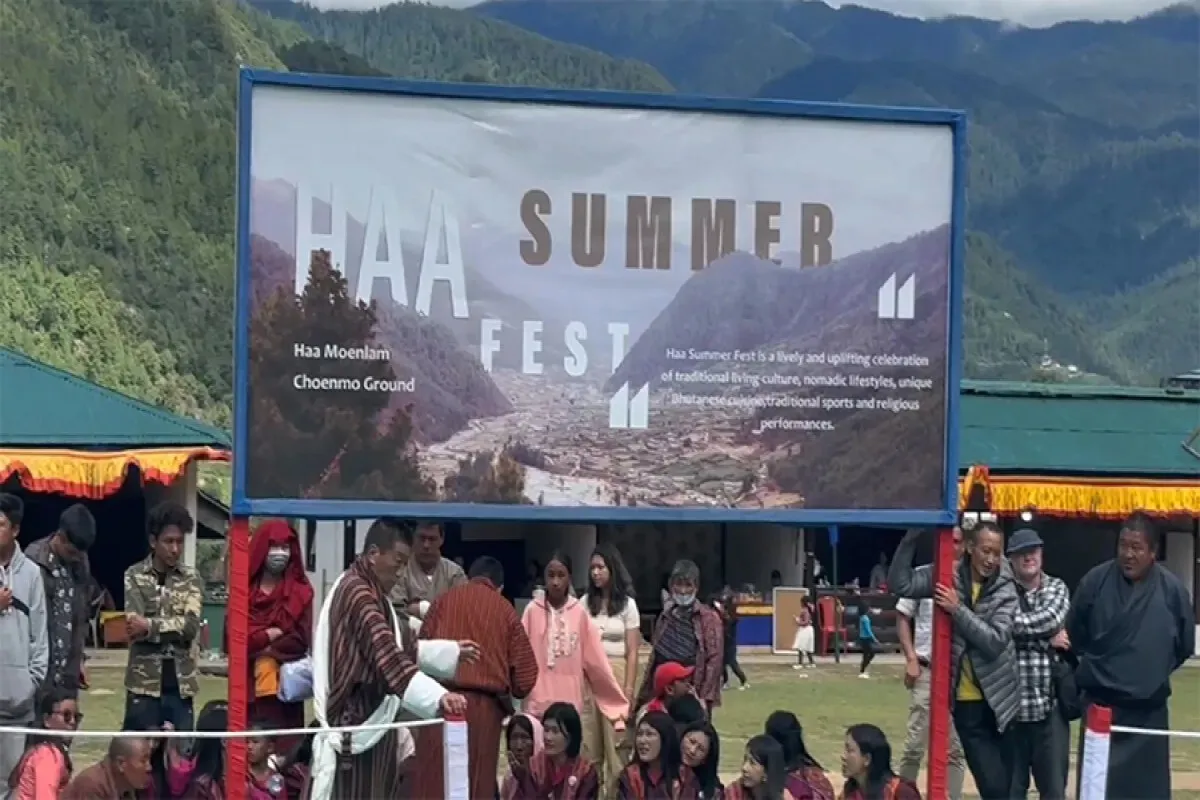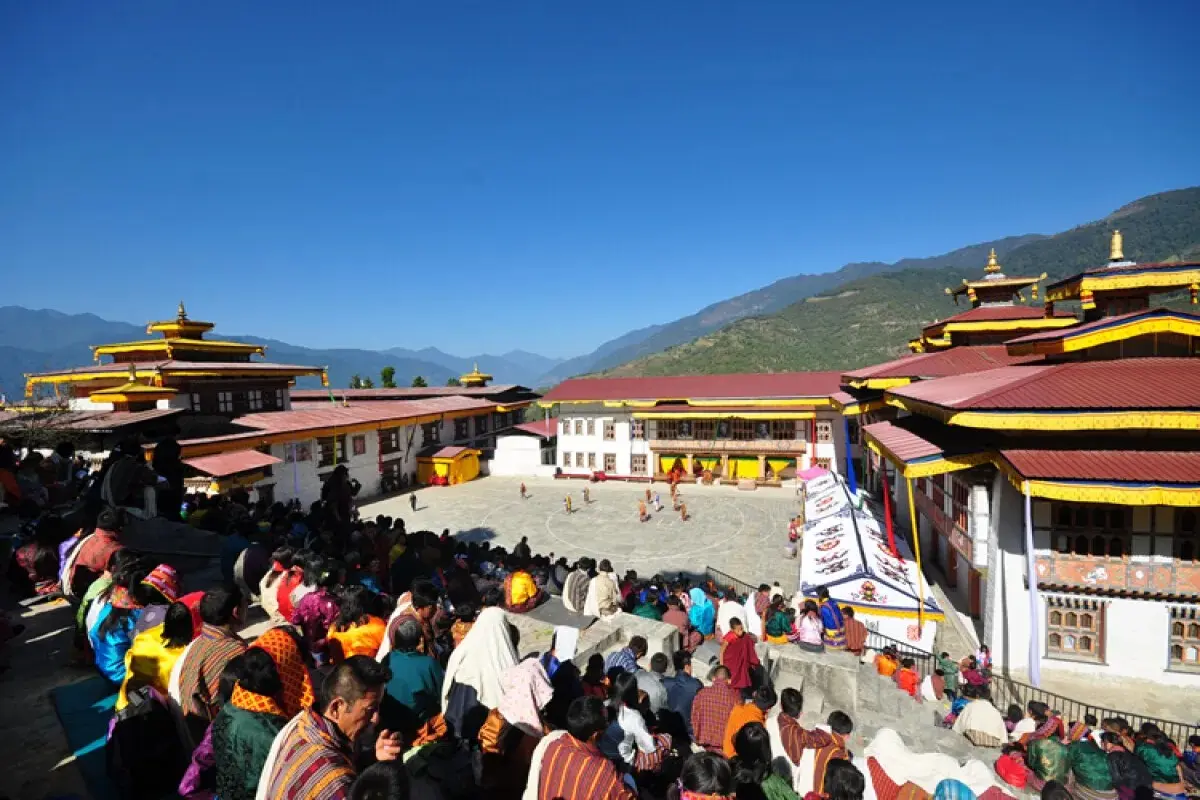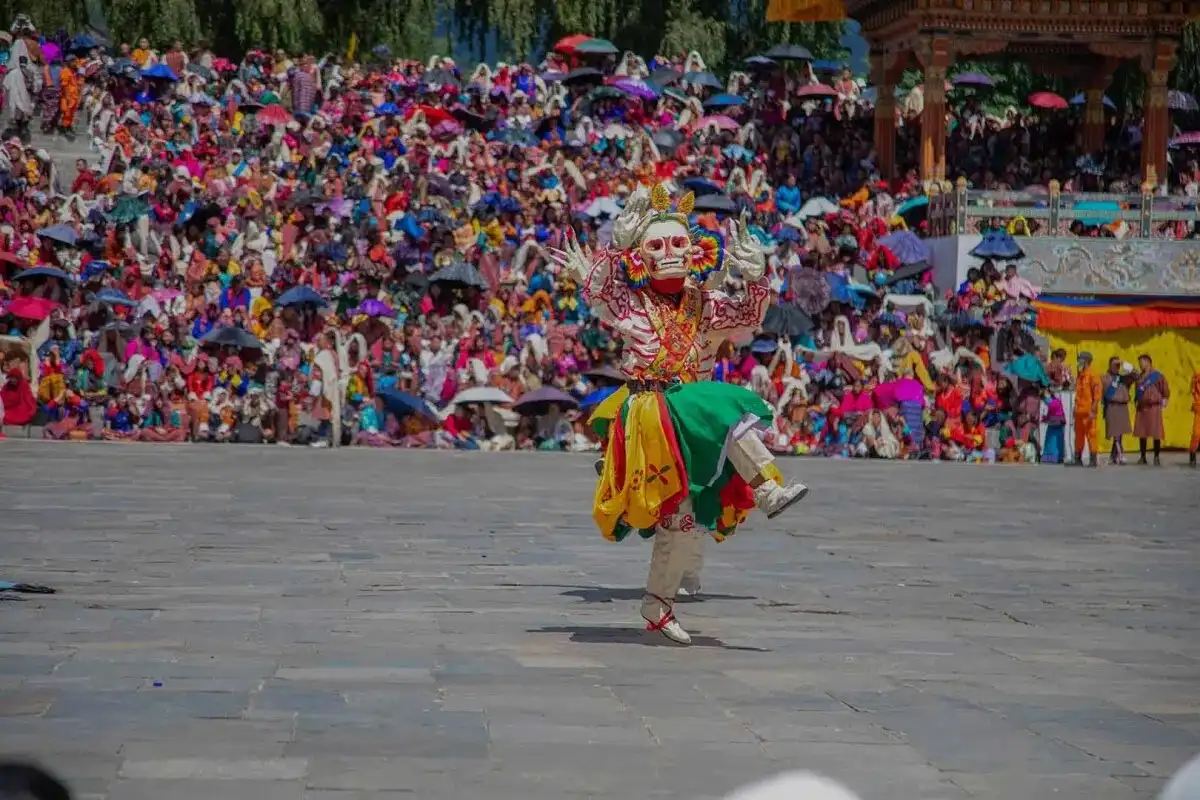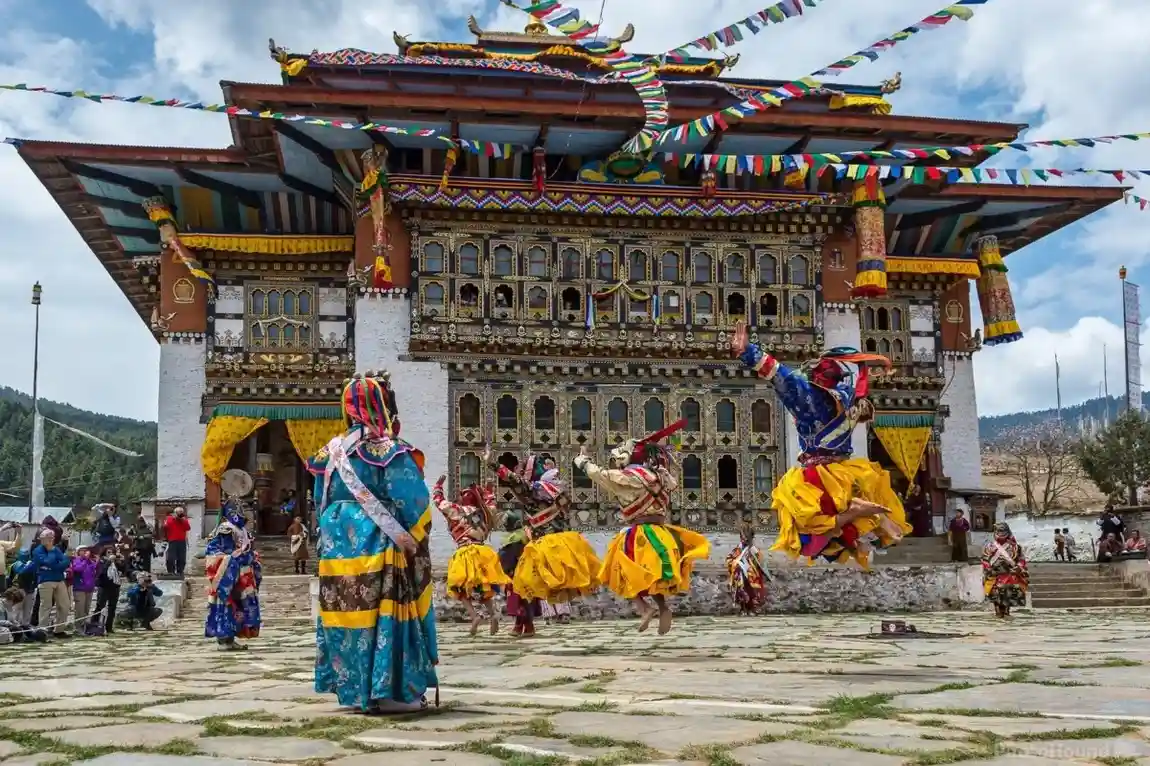Punakha Tsechu Festival Tour - 9 Days
This tour takes you on an exceptional adventure into the traditions and religious celebrations of Bhutan. Against the impressive Punakha Dzong, the festival gives visitors a chance to witness Bhutan’s beautiful traditions, lively dances in masks, and deep Buddhist heritage.
Highlights
- Festival Duration: 3 days
- Best Time to Visit: February - March
- Location: Punakha Dzong, Punakha Valley
- Altitude: 1,200 meters (3,937 feet)
- Difficulty Level: Easy to moderate
Trip Overview
When the annual Tsechu festival takes place, Punakha, the past royal capital and home to the Je Khenpo, is loaded with lively activities. Every year, at the three-day festival in February or March, the peaceful valley comes alive with color, passion, and people’s cultural pride.
Major Highlights
The Sacred Cham Dances
The main highlight of the Punakha Tsechu is a collection of beautiful mask dances revealed by monks and laymen within the dzong’s courtyard. Still practiced the same way for thousands of years, these dances celebrate the struggle of good against evil. They are used as a religious exercise and also to preserve local customs.
Punakha Dzong Architecture
Punakha Dzong is also called the “Palace of Great Happiness,” and is placed where the rivers Pho Chhu and Mo Chhu meet. In 1637, without relying on a single nail, this incredible building was finished and became a monastery and the administration’s center. When the festival is on, the dzong’s yards become full of festivities, allowing everyone to visit the normally restricted sacred areas.
Cultural Immersion
People at the festival can interact with locals dressed in the best of their traditional clothing. People who come can observe age-old traditions like offering butter lamps and watching huge religious paintings open, and celebrate these events with people from the area.
Himalayan Scenery
The whole trip takes place in Punakha Valley, and its amazing views come from snow-capped mountains and terraced fields. The combination of colorful festival sights and the peaceful mountain scenery provides memorable photos and peaceful moments to think. People have the opportunity to watch skilled artisans at work and pick up homemade souvenirs from them.
Traditional Arts and Crafts
Local artists show their talent during the Tsechu festival, displaying Bhutanese handicrafts that includes hand-woven textiles, wood carvings, and other crafts. We can watch craftsmen at work and buy authentic souvenirs directly from the creators.
Cultural Significance and Traditions
Religious Importance
Punakha Tsechu is an effective spiritual purification ceremony for all those who participate or witness it. Masked dances of the festival signify the suppression of wicked souls and the safeguarding of the Buddhist religion. The local beliefs are that attendance at these religious dramas accrues merit and neutralizes bad karma.
The Punakha Dzong festival tradition goes back to the 17th century, as this is when Zhabdrung Ngawang Namgyal, the founder of modern Bhutan, established the festival. The festival is about religious faith as well as Bhutanese national identity, strengthening cultural values and a sense of community.
The competitors wear the best traditional attire, the gho and kira, respectively. Families cook specific dishes, present butter lamps, and take part in collective prayers. The festival is a reunion period among extended families, and it enhances social ties among communities.
What to Expect
Accommodation Standards
The tour participants will remain in well-selected hotels and resorts, which offer a good combination of traditional Bhutanese architecture and modern facilities. Properties include traditional architectural elements and local artwork and culture, and offer comfortable beds, modern bathrooms, and heating systems that are necessary in the winter season when the festival is held.
Cuisine and Dining
The food, Bhutanese cuisine, is prominently on display during the tour, and meals will consist of the national dish, ema datshi (chilies with cheese), red rice, and different vegetable curries. There are international cuisine options that cater to persons with dietary restrictions. The festival time is the time to taste the traditional feast foods and the local delicacies that are cooked especially during the festival.
Weather Conditions
The Punakha Tsechu Festival is best attended in February and March. Days are sunny and mild with an average temperature of 15-20 (59-68 F), whereas evenings are cool, 5-10 (41-50 F). During winter, the skies are clear and offer great visibility of the mountains and chances of taking photographs.
Conclusion
The Punakha Tsechu Festival Tour is an unprecedented chance to grasp the living cultural heritage of Bhutan in the most natural environment. In addition to the amazing masked dances and religious festivals, participants will get an intimate knowledge of Bhutanese values, community life, and spiritual practices that have not changed in centuries.
This well planned tour itinerary balances cultural immersion along with comfortable travel, ensuring travelers can fully soak in the festival's spiritual significance while enjoying Bhutan's renowned hospitality and natural beauty. The memories created during this cultural celebration will last a lifetime, allowing interaction of one of the world's most fascinating and well-preserved cultures.
The Punakha Tsechu Festival Tour offers more than just sightseeing; it provides a cultural experience that connects travelers with the heart and soul of the Last Shangri-La. Whether you are seeking for a spiritual understanding, cultural exposure, or simply unforgettable travel memories, this tour offers an authentic and meaningful journey to Bhutan.
When the annual Tsechu festival takes place, Punakha, the past royal capital and home to the Je Khenpo, is loaded with lively activities. Every year, at the three-day festival in February or March, the peaceful valley comes alive with color, passion, and people’s cultural pride.
Major Highlights
The Sacred Cham Dances
The main highlight of the Punakha Tsechu is a collection of beautiful mask dances revealed by monks and laymen within the dzong’s courtyard. Still practiced the same way for thousands of years, these dances celebrate the struggle of good against evil. They are used as a religious exercise and also to preserve local customs.
Punakha Dzong Architecture
Punakha Dzong is also called the “Palace of Great Happiness,” and is placed where the rivers Pho Chhu and Mo Chhu meet. In 1637, without relying on a single nail, this incredible building was finished and became a monastery and the administration’s center. When the festival is on, the dzong’s yards become full of festivities, allowing everyone to visit the normally restricted sacred areas.
Cultural Immersion
People at the festival can interact with locals dressed in the best of their traditional clothing. People who come can observe age-old traditions like offering butter lamps and watching huge religious paintings open, and celebrate these events with people from the area.
Himalayan Scenery
The whole trip takes place in Punakha Valley, and its amazing views come from snow-capped mountains and terraced fields. The combination of colorful festival sights and the peaceful mountain scenery provides memorable photos and peaceful moments to think. People have the opportunity to watch skilled artisans at work and pick up homemade souvenirs from them.
Traditional Arts and Crafts
Local artists show their talent during the Tsechu festival, displaying Bhutanese handicrafts that includes hand-woven textiles, wood carvings, and other crafts. We can watch craftsmen at work and buy authentic souvenirs directly from the creators.
Cultural Significance and Traditions
Religious Importance
Punakha Tsechu is an effective spiritual purification ceremony for all those who participate or witness it. Masked dances of the festival signify the suppression of wicked souls and the safeguarding of the Buddhist religion. The local beliefs are that attendance at these religious dramas accrues merit and neutralizes bad karma.
The Punakha Dzong festival tradition goes back to the 17th century, as this is when Zhabdrung Ngawang Namgyal, the founder of modern Bhutan, established the festival. The festival is about religious faith as well as Bhutanese national identity, strengthening cultural values and a sense of community.
The competitors wear the best traditional attire, the gho and kira, respectively. Families cook specific dishes, present butter lamps, and take part in collective prayers. The festival is a reunion period among extended families, and it enhances social ties among communities.
What to Expect
Accommodation Standards
The tour participants will remain in well-selected hotels and resorts, which offer a good combination of traditional Bhutanese architecture and modern facilities. Properties include traditional architectural elements and local artwork and culture, and offer comfortable beds, modern bathrooms, and heating systems that are necessary in the winter season when the festival is held.
Cuisine and Dining
The food, Bhutanese cuisine, is prominently on display during the tour, and meals will consist of the national dish, ema datshi (chilies with cheese), red rice, and different vegetable curries. There are international cuisine options that cater to persons with dietary restrictions. The festival time is the time to taste the traditional feast foods and the local delicacies that are cooked especially during the festival.
Weather Conditions
The Punakha Tsechu Festival is best attended in February and March. Days are sunny and mild with an average temperature of 15-20 (59-68 F), whereas evenings are cool, 5-10 (41-50 F). During winter, the skies are clear and offer great visibility of the mountains and chances of taking photographs.
Conclusion
The Punakha Tsechu Festival Tour is an unprecedented chance to grasp the living cultural heritage of Bhutan in the most natural environment. In addition to the amazing masked dances and religious festivals, participants will get an intimate knowledge of Bhutanese values, community life, and spiritual practices that have not changed in centuries.
This well planned tour itinerary balances cultural immersion along with comfortable travel, ensuring travelers can fully soak in the festival's spiritual significance while enjoying Bhutan's renowned hospitality and natural beauty. The memories created during this cultural celebration will last a lifetime, allowing interaction of one of the world's most fascinating and well-preserved cultures.
The Punakha Tsechu Festival Tour offers more than just sightseeing; it provides a cultural experience that connects travelers with the heart and soul of the Last Shangri-La. Whether you are seeking for a spiritual understanding, cultural exposure, or simply unforgettable travel memories, this tour offers an authentic and meaningful journey to Bhutan.
Short Itinerary
Land in Paro and explore the charming town. Get a quick trip briefing and enjoy your first taste of Bhutanese hospitality.
Drive to the capital. Visit Memorial Chorten, Tashichho Dzong, and local markets. Enjoy a cultural show and dinner.
Visit Buddha Dordenma, heritage museums, and shop for local crafts. Enjoy city vibes with a traditional touch.
Cross Dochula Pass with Himalayan views. Arrive in Punakha and prepare for the festival.
Experience mask dances and spiritual rituals at Punakha Dzong. Immerse in local culture.
Enjoy more sacred dances, blessings, and traditional music. Feel the vibrant festival spirit.
Witness the sacred Thongdrol unveiling. Visit Chimi Lhakhang and enjoy a farewell cultural dinner.
Drive back, visit Paro Dzong and the National Museum. Relax and pack.
Say goodbye to Bhutan with a heart full of memories.
Price Includes
- Pick-up and drop-off services
We provide a pick-up service from the airport to the hotel on your arrival day and from the hotel to the airport on the departure day.
- Lunch, Breakfast, and Dinner
All meals during the trek will be provided by the company. However, personal food items like coffee, tea, cold drinks, etc, are not included in the package.
- A guide proficient in English
A certified, English-speaking guide will accompany you throughout the trip. The guide will offer information about the trail, culture, nature, and history, and ensure your safety and a smooth experience.
- Comfortable SUV vehicle
A private SUV will be used for road travel before or after the trek. These vehicles are ideal for Bhutan’s hilly terrain and provide a comfortable ride.
- All types of entry costs
This covers all permit fees, monument entrance fees, park fees, and any other official charges required for trekking or sightseeing activities during the tour.
- Professional Drive
We ensure a safe and smooth drive during your tour. We have licensed and experienced drivers for that.
- Sleeping bag and tent
Quality sleeping bags and tents are provided for your comfort and warmth during the camping nights on the trek. So, you don’t have to worry about buying a new one.
- Farewell dinner
A special farewell meal, typically arranged in a traditional restaurant, is offered at the end of the tour to celebrate the journey and thank the participants.
- Evening Tea/coffee with snacks
Each evening, you’ll be served tea or coffee along with light snacks like biscuits and popcorn.
- Drinking Water
Safe and clean drinking water is provided throughout the trek.
- Pick-up and drop-off services
We provide a pick-up service from the airport to the hotel on your arrival day and from the hotel to the airport on the departure day.
- Lunch, Breakfast, and Dinner
All meals during the trek will be provided by the company. However, personal food items like coffee, tea, cold drinks, etc, are not included in the package.
- A guide proficient in English
A certified, English-speaking guide will accompany you throughout the trip. The guide will offer information about the trail, culture, nature, and history, and ensure your safety and a smooth experience.
- Comfortable SUV vehicle
A private SUV will be used for road travel before or after the trek. These vehicles are ideal for Bhutan’s hilly terrain and provide a comfortable ride.
- All types of entry costs
This covers all permit fees, monument entrance fees, park fees, and any other official charges required for trekking or sightseeing activities during the tour.
- Professional Drive
We ensure a safe and smooth drive during your tour. We have licensed and experienced drivers for that.
- Sleeping bag and tent
Quality sleeping bags and tents are provided for your comfort and warmth during the camping nights on the trek. So, you don’t have to worry about buying a new one.
- Farewell dinner
A special farewell meal, typically arranged in a traditional restaurant, is offered at the end of the tour to celebrate the journey and thank the participants.
- Evening Tea/coffee with snacks
Each evening, you’ll be served tea or coffee along with light snacks like biscuits and popcorn.
- Drinking Water
Safe and clean drinking water is provided throughout the trek.
Price Excludes
- International Airfare
- Visa Charges and Insurance
- Individual expenditures
- Additional-day lodging
- Laundry and telephone expenses
- Tips for the guide and the porter
- International Airfare
- Visa Charges and Insurance
- Individual expenditures
- Additional-day lodging
- Laundry and telephone expenses
- Tips for the guide and the porter
Punakha Tsechu Festival Tour Itinerary
Once landing at Paro International Airport, you’ll experience how tricky it is to reach this airport, which is surrounded by soaring peaks that are 5,000 meters high. After you land, meet the staff sent by the local company. Then, check into your hotel and do a walk to see the town. Stop by markets and attractions that represent the traditional style of the country. In the evening, we will let you know about the festival and how you can fit into the local culture.
In the morning, we will take you to Thimphu, the capital city (a drive of 1.5 hours), and you will pay a visit to the National Memorial Chorten that is located there. In the morning, we visit Tashichho Dzong, place where the government’s and spiritual leaders’ offices are located. We will also visit the weekend market (if the weekend) showcasing local produce, handicrafts, and traditional foods. We will end the day with a traditional Bhutanese cultural show and dinner at a local restaurant.
On the third day, we will visit the Buddha Dordenma statue, offering overall view of the Thimphu valley. Explore the Folk Heritage Museum showcasing traditional Bhutanese lifestyle. After that, we visit the National Textile Museum and observe traditional weaving techniques. Stop at the Centenary Farmers Market for local interactions. You’ll get some free time for shopping at the Craft Bazaar for authentic Bhutanese handicrafts.
We will drive over Dochula Pass (3,100m) with spectacular Himalayan views on clear days and stop at the 108 chortens built by the Queen Mother. Then, arrive in Punakha and check into the accommodation. Rest and prepare for the festival. Evening briefing about festival schedule and photography guidelines.
Today early morning, we will enter Punakha Dzong for the opening ceremonies to witness the morning prayers and preliminary ritual preparations performed by monks. Experience the first day of sacred Cham dances, including the "Dance of the Drummers from Dramitse" and "Black Hat Dance." You will observe local families in traditional dress participating in the festivities. We'll continue watching various mask dances and folk performances. Interact with locals and learn about the spiritual significance of each performance from your guide. After that, return to the accommodation for rest and a traditional dinner.
On the second day of festivities, we will go back to the dzong and witness the Raksha Mangcham and other religious dances. You will also take part in the morning blessing ceremonies and butter lamp offerings. Note the complicated preparation of ritual objects and sacred items. You will also enjoy a special dinner in the evening, where you can taste the traditional music and food of the place.
On the 7th day, you will witness the giant Thongdrol (sacred tapestry) early in the morning. This is supposed to be the most holy time of the festival, and it is believed that the sins are cleansed by just looking at it. It is upon this last day of the festival performances that we shall observe the Dance of the Stags, and the ceremonies of conclusion. Next, go to Chimi Lhakhang, the temple of fertility of the Divine Madman. A farewell dinner will be provided to you with a cultural performance by the local artists.
Know Before You Travel
-
Everyone traveling to Bhutan must obtain a visa:
which is processed by authorized tour companies. Old passports that have a validity of at least six months are required. The tourist visas are handled by the tour operator and form part of the tour package.
The tour focuses on responsible tourism behaviours such as contributing to the local people, limiting the effect on the environment, and adhering to cultural values. The accommodation and activities are chosen to ensure that they give a real experience and also ensure that they help in the local economic growth.
The itineraries can be tailored to add more cultural attractions, longer visits to certain places, or to have special interests like photography classes, meditation retreats, or learning handicrafts. With private tours, there is the greatest flexibility in special interests or physical needs.
Map-Punakha-Tsechu-Festival-Tour
Download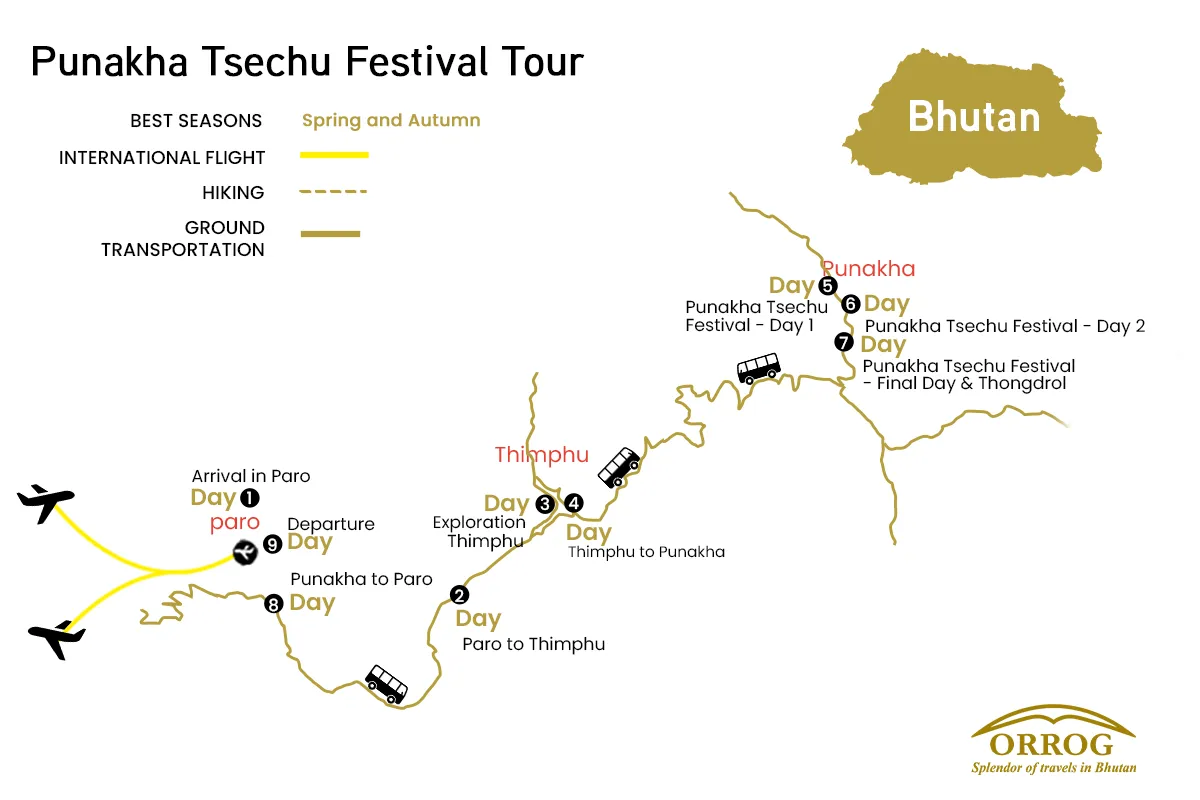
FAQs for Punakha Tsechu Festival Tour
Orrog is one of the best trekking companies in Bhutan. We are a certified travel company and have many years of experience.
This trek is easy. Any age group can complete this trek without difficulty.
You need a visa and all necessary permits for your trip. These documents can not be received on the day of your arrival, so they must be processed before coming here. After you book a trip with us, we will manage these papers for you. Your Bhutan visa is arranged by Orrog as part of the package.
The main way to come to Bhutan is through Paro International Airport, which is well-connected to cities like Bangkok, Delhi, Kathmandu, and Singapore. Most people arrive by air, but if you plan to come via road, you can enter through Phuentsholing, located on the southern border with India, which is the most commonly used entry point.
It is recommended to apply for the visa at least 20 days before your planned departure date so that there is enough time for processing your Bhutan visa, finalizing your itinerary, and arranging your guides and transportation. Although visa processing itself is relatively fast once payment is received, early preparation helps avoid delays and ensures availability, especially during peak seasons (spring and autumn).
You don’t require a passport-size photo for the visa, but it is wise to carry at least 2–4 recent passport-sized photographs during your trip. These may be needed for local permits, registration, or when applying for a local SIM card upon arrival in Bhutan.
Yes, you can lengthen your stay in Bhutan either before or after your trip. Bhutan’s tourism model requires visitors to pay a Sustainable Development Fee (SDF) and a daily package cost, so any extra days will involve additional charges. Extensions are a great opportunity to explore cultural sites in Paro, Thimphu, or even add another short trip or day hike.
Yes, Bhutan requires full tour payment in advance before your visa can be processed and issued. The government of Bhutan regulates this policy to ensure that all travel arrangements are confirmed through a licensed Bhutanese tour operator. We are a licensed tour operator that ensures you have everything you need for a trouble-free trip.
Any personal expenses are not covered in the package like:
- Tips for your guide and other staff
- Bottled drinks and snacks(personal expense)
- Souvenirs or local crafts
Credit cards are easily accepted in major cities like Paro and Thimphu. But in remote areas, you may not have access to a card or an ATM. So, it is best to carry some cash before heading for the trip.
Tipping is not mandatory, but it is a widely appreciated gesture and a customary way to show gratitude for good service. The tipping guideline would be to give USD 5-10 per day as a tip for the guides and other staff.
Paro International Airport is the only international airport in Bhutan. It is well connected by flights from cities like Bangkok, Delhi, Kathmandu, and Singapore.
Yes, airport pick-up and drop-off are included in the package. We will have your guide and driver meet you at the airport and transport you to your hotel.
While Bhutan's roads are mostly paved, some parts are narrow, winding, and occasionally affected by weather. However, we ensure your travel is safe, well-maintained, and driven by an experienced professional throughout the journey.
Once you arrive in Paro, we will arrange private ground transportation to the starting point as we pass through lush valleys and traditional villages. So, you don’t have to worry about any transportation services.
Yes, it is very safe to travel even with children in Bhutan. Roads are well-maintained, and the pace of travel is generally relaxed and child-friendly.
We will usually travel in comfortable, private vehicles with experienced drivers. All ground transportation is included in your package.
The Bhutanese Ngultrum is used in Bhutan. All local transactions during the trip will be in BTN.
US Dollars (USD) are generally accepted at larger hotels, souvenir shops, and tour operators, particularly in Paro and Thimphu. However, it’s advisable to convert your currency to BTN for general purchases in rural areas. Other currencies like the Euro or the Pound are not commonly accepted directly.
No, credit or debit cards are not accepted on the trip, as it takes you through remote regions with no banking or electronic payment access. All trip-related payments like accommodation, meals, permits, etc, are paid in advance.
You can exchange foreign currency at the Paro International Airport, at banks, or through licensed money changers in cities like Thimphu and Paro. It's best to exchange enough cash before heading out on the trip.
The national language is Dzongkha, but many Bhutanese also speak English. If you speak English and are worried about communicating with the local people, you will have your guide as a translator.
Yes, all licensed tour guides in Bhutan are required to speak fluent English. Many are also trained in other languages such as German, Japanese, or French. Communication during the trip will be smooth and clear in English.
Most signboards, tourist maps, and information brochures are written in English, especially in tourist destinations like Paro, Thimphu, and trailheads. Directional signs along routes are often labeled in both Dzongkha and English.
No, learning Dzongkha is not at all needed for the trip, but knowing a few basic words like "Kuzu zangpo la" (Hello) or "Kadrinche la" (Thank you) is a good way to interact with the locals.
Language barriers are minimal, as your guide will handle all communication with locals and support staff. Your guide will translate for you during your interaction with the locals.
To greet people, you can greet with locals “Kuzu zangpo la” (Hello) by performing a slight bow. Most common greetings include physical greetings, such as shaking hands less visible, especially in rural areas.
Yes, but remember to seek permission, especially when taking photos of monks, locals, or temples. Please note that clicking photos is not allowed at most religious sites.
Visitors should dress modestly and respectfully. This means:
- Covering shoulders and knees
- Removing hats and sunglasses
- Not wearing shorts or sleeveless tops
This applies to both men and women.
Yes, Bhutanese society is deeply rooted in Buddhism and tradition. Here are some key taboos:
- Do not point your feet at people or sacred objects
- Never touch anyone on the head, as it is considered sacred
- Walk clockwise around temples, stupas, and religious monuments
- Avoid public displays of affection
While gifts are not expected, they may be accepted graciously if given with respect. It is advisable to consult with the guide before giving out anything.
Bhutan typically uses Type C, Type D, and Type G electrical outlets. Standard safe voltage is 230V and frequency is 50Hz; therefore, ensure that your equipment is compatible with this voltage.
Indeed, it is highly advised to take along a universal travel adapter, particularly one to fit a variety of types of plugs, because plugs can be different in a hotel or a guesthouse.
Bhutan follows Bhutan Time (BTT), which is UTC/GMT +6 hours. This time zone remains consistent throughout the year.
No, Bhutan does not observe daylight saving time. The country maintains the same time year-round.
Bhutan is 30 minutes ahead of India. For example, 12:00 PM in India is 12:30 PM in Bhutan.
Yes, souvenirs can be bought in Paro or Thimphu before or after the trip.
Some popular souvenirs include hand-woven textiles (kira and gho fabric), prayer flags, thangka (religious scroll) paintings, handmade paper products, traditional masks, and Buddhist artifacts.
You can do some gentle bargaining in local street markets. However, in government-run shops and fixed-price stores, prices are usually non-negotiable.
Only some larger shops in cities like Paro and Thimphu accept credit cards. The remote areas might not have a card payment option, so we suggest that you carry some cash.
Yes, you can easily purchase a SIM card upon arrival in Bhutan. We will assist you with the process, and you'll need a passport copy and a passport-sized photo.
No, internet access is not available during the trip. However, Wi-Fi is available in hotels in Paro and Thimphu before and after the trip.
B-Mobile (by Bhutan Telecom) and TashiCell are the two main service providers. B-Mobile tends to have better coverage in rural and mountainous areas
Since the weather can be unpredictable and temperatures can vary drastically, layered clothing is essential. You should pack:
- Base layers (thermal tops and bottoms)
- Insulating layers like fleece or down jackets
- Waterproof and windproof outer layers
- Warm hats, gloves, and neck gaiters for freezing conditions
- Moisture-wicking socks and weatherproof trekking boots
Nighttime temperatures can be extremely cold, especially at high-altitude places. So you need to have enough clothing to keep you warm.
The weather is clear with mild daytime temperatures during spring and autumn.
Tsechu is a religious festival held in honor of Guru Rinpoche, featuring mask dances, rituals, and traditional performances. It's a colorful and spiritual experience for all ages.
Yes, festivals are family-friendly and offer a unique cultural experience for children, although large crowds can be overwhelming for very young kids.
Modest, respectful attire is recommended. Traditional Bhutanese dress (Gho/Kira) is encouraged and can be arranged for you.
Yes, all tours include certified, English-speaking guides who are knowledgeable in Bhutanese history and culture.
You can learn about the Bhutanese culture through local interactions, homestay visits, cooking classes, traditional art workshops, and attending local festivals and religious ceremonies.
Reviews & Ratings
-
Guarantee -
Thimphu,Bhutan -
975+17160228
Ready to Explore Bhutan?
Start your journey today and discover the magic of Bhutan with our expert guides and carefully crafted tours.
Book This Trip
-
No booking or credit card fees -
Best price guarantee -
Full customize trip
Ask a Question
Feel free to ask us anything about this tour. A travel expert will then get back to you as soon as possible
Ready to Explore Bhutan?
Start your journey today and discover the magic of Bhutan with our expert guides and carefully crafted tours.
